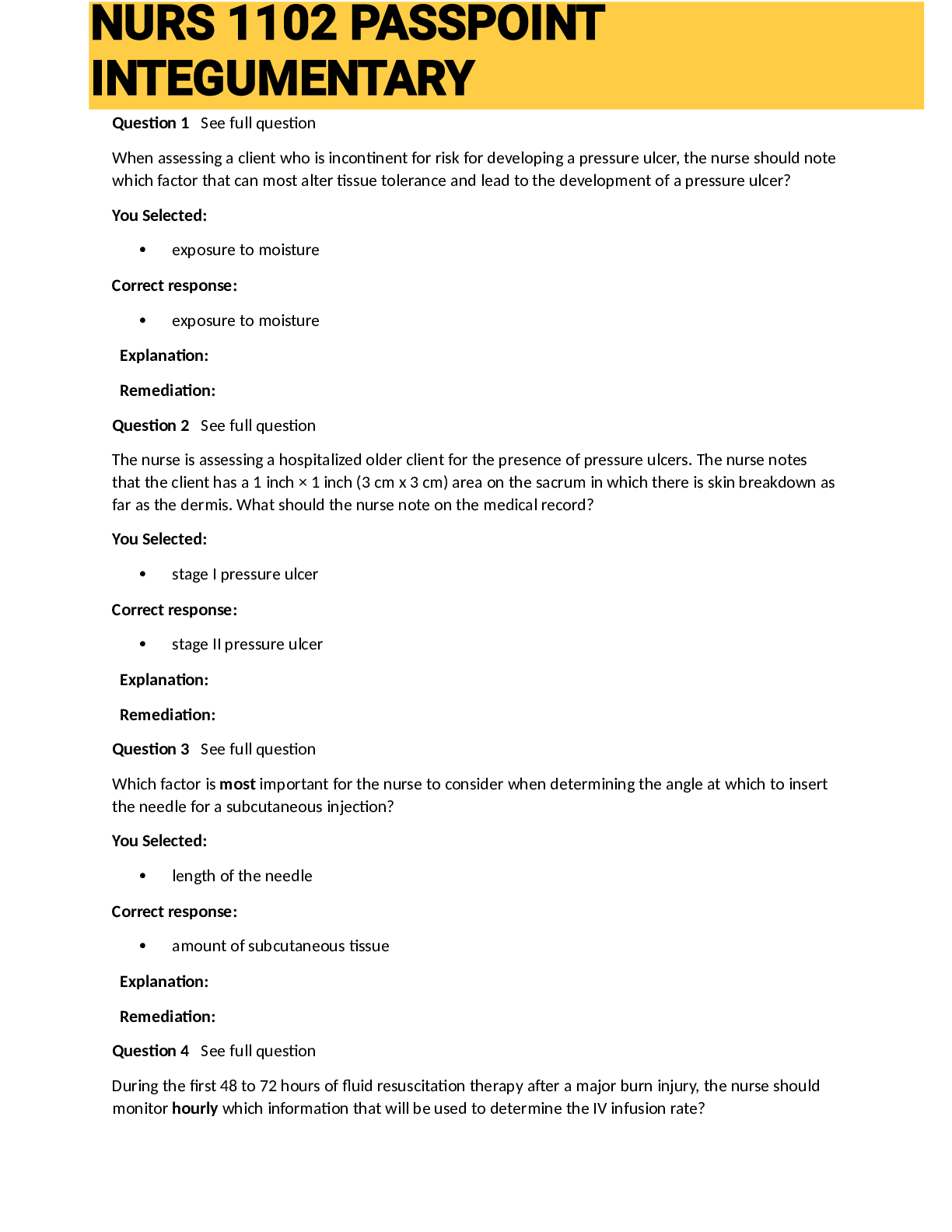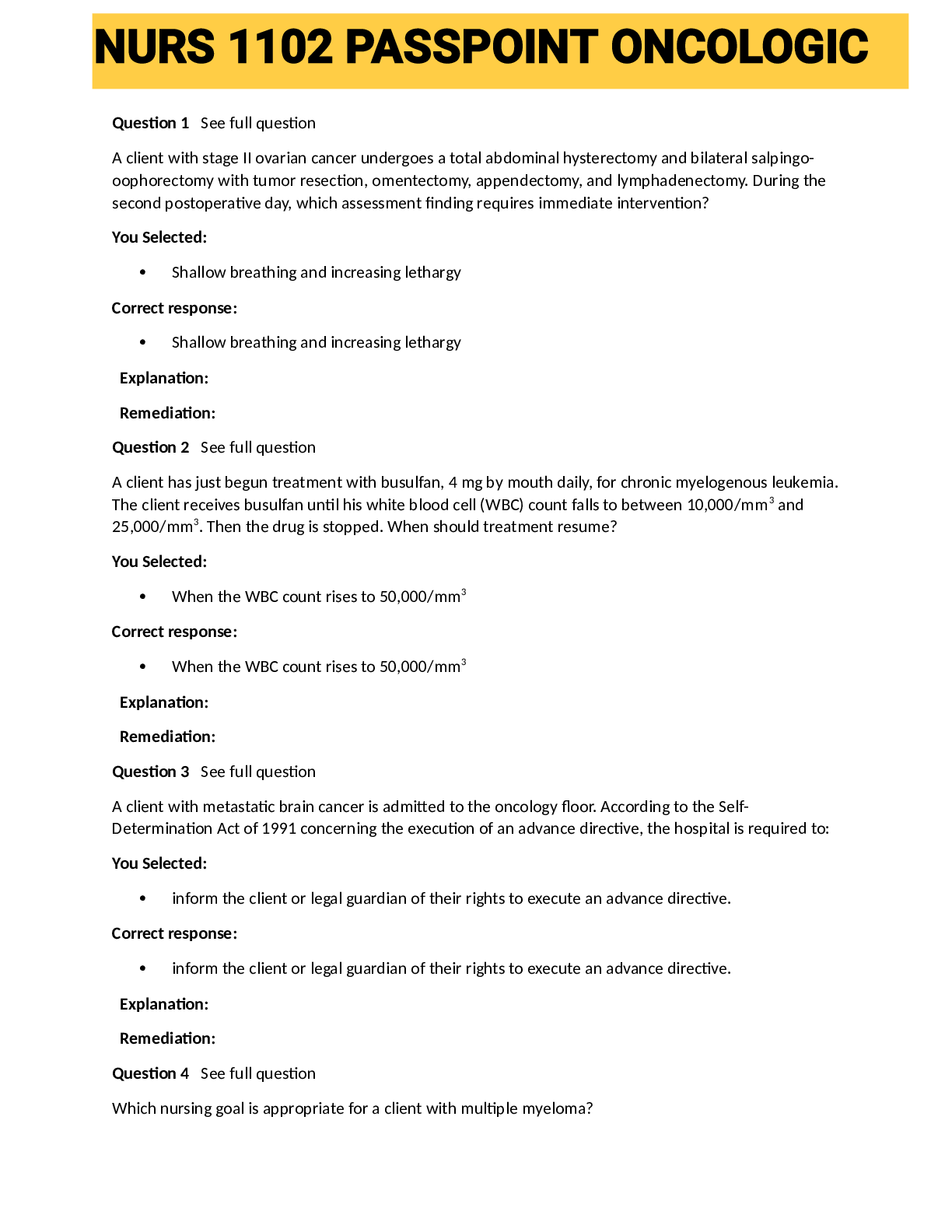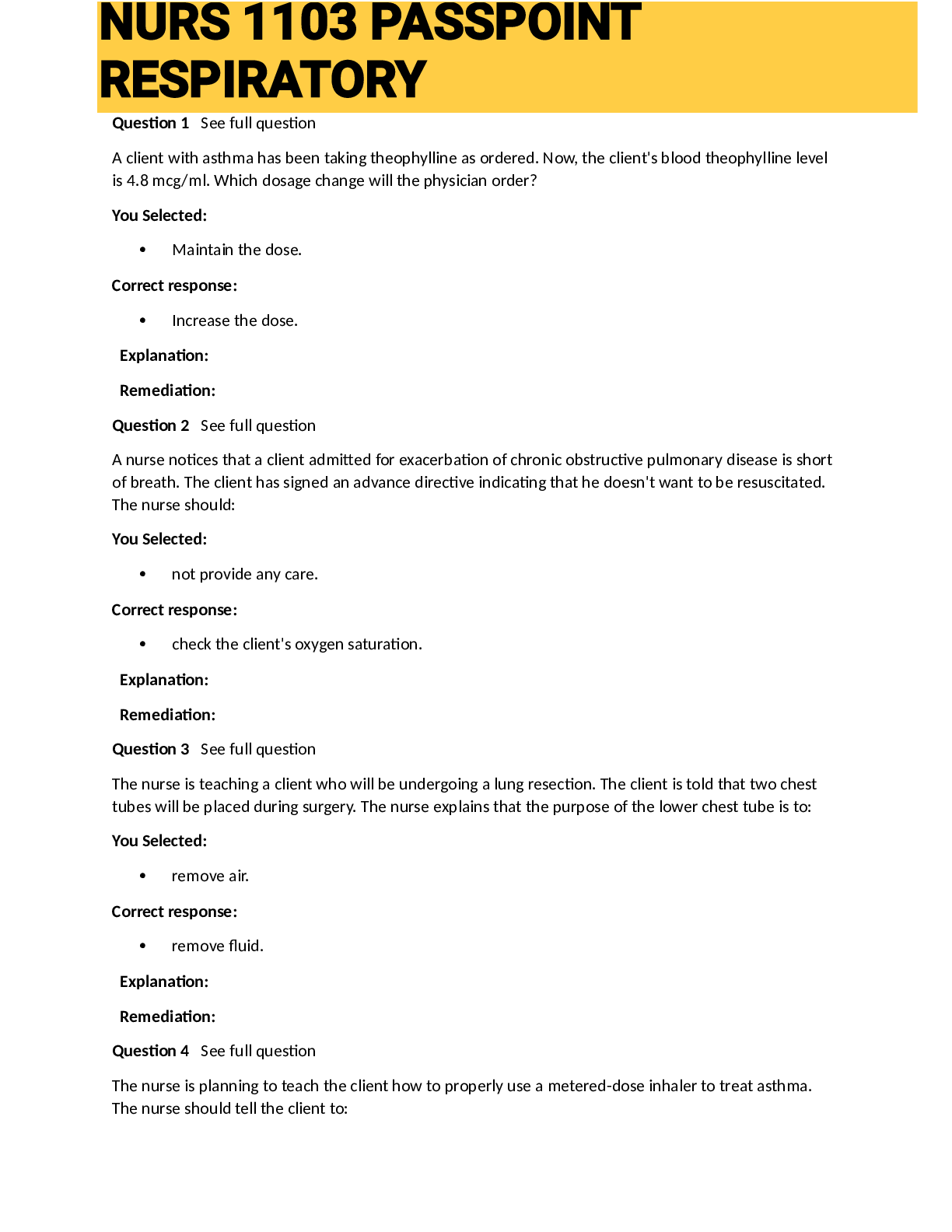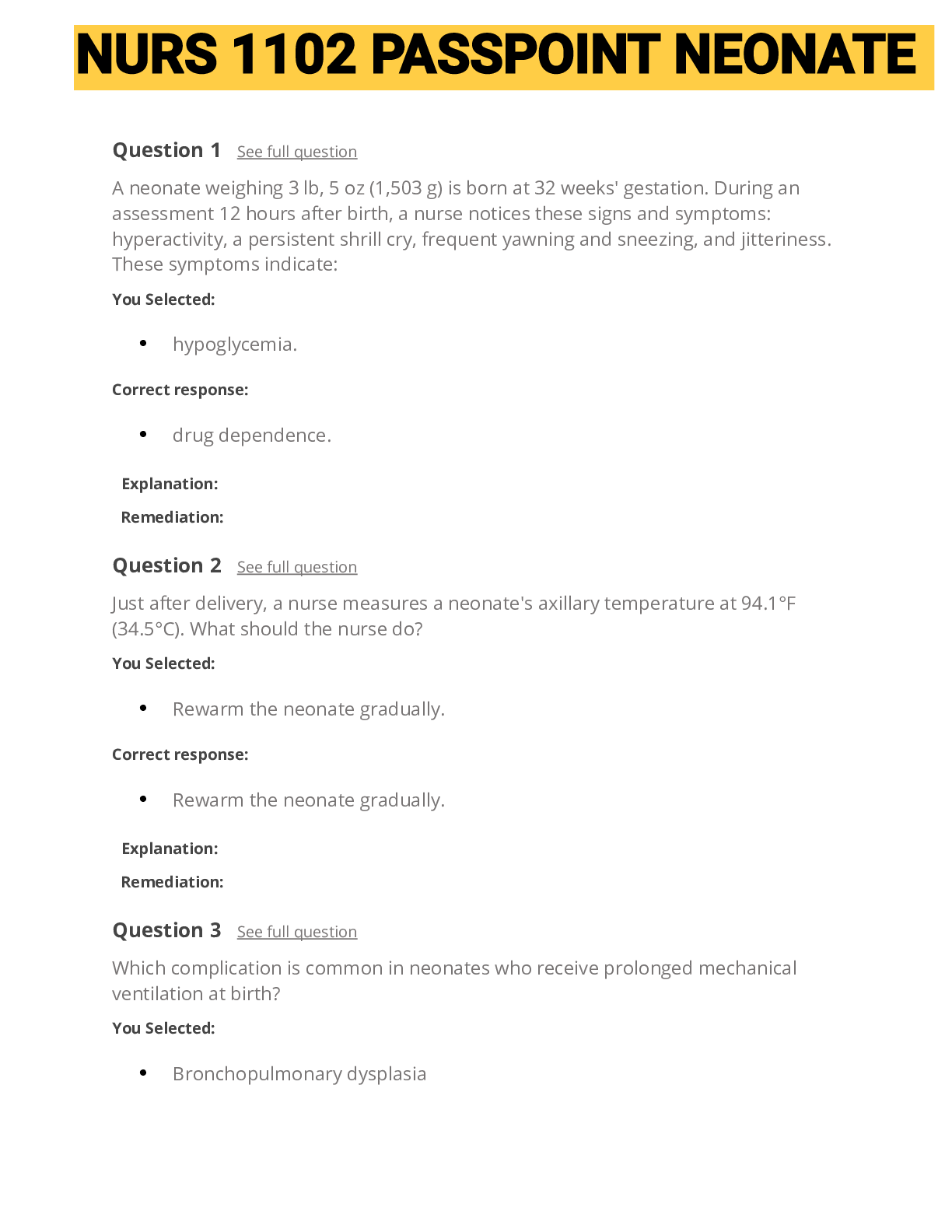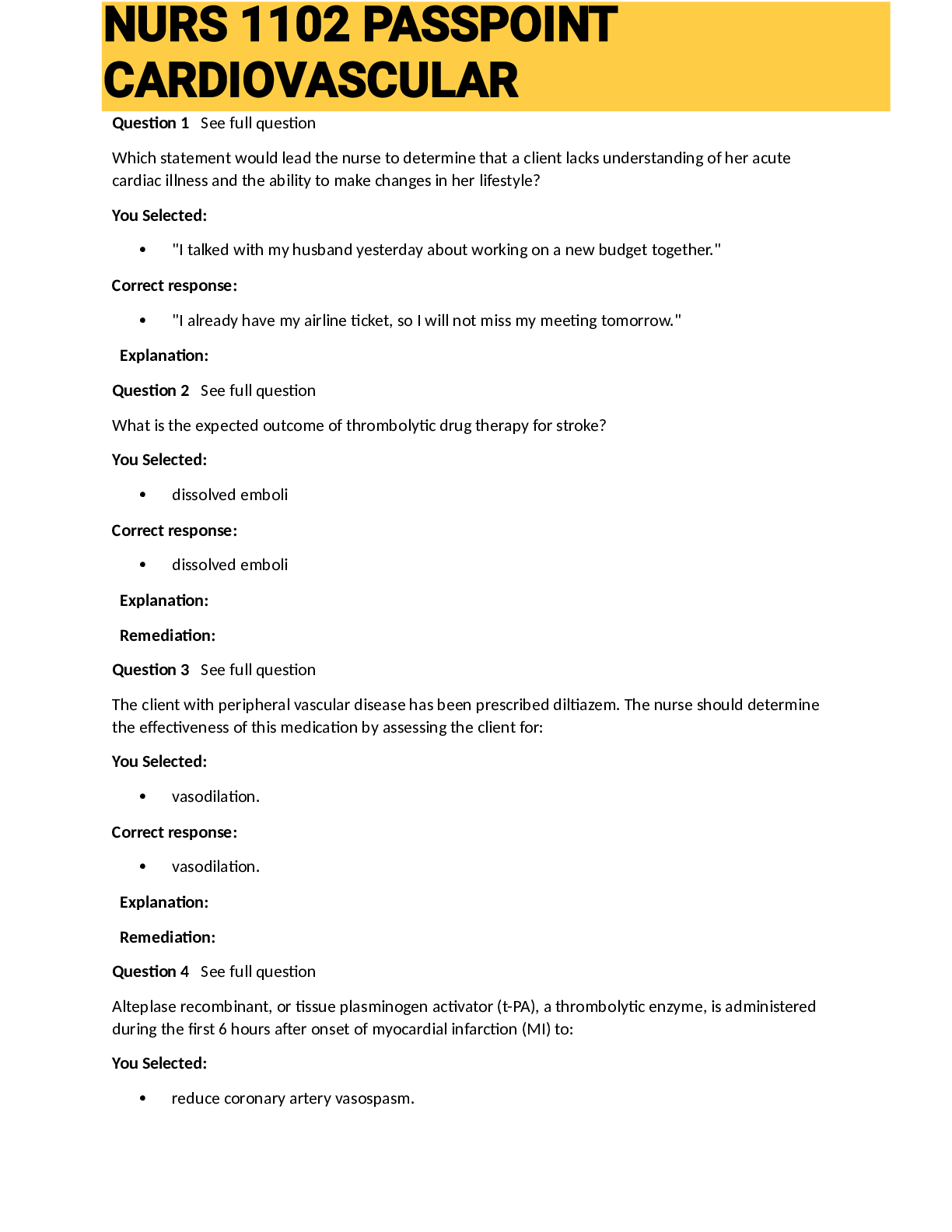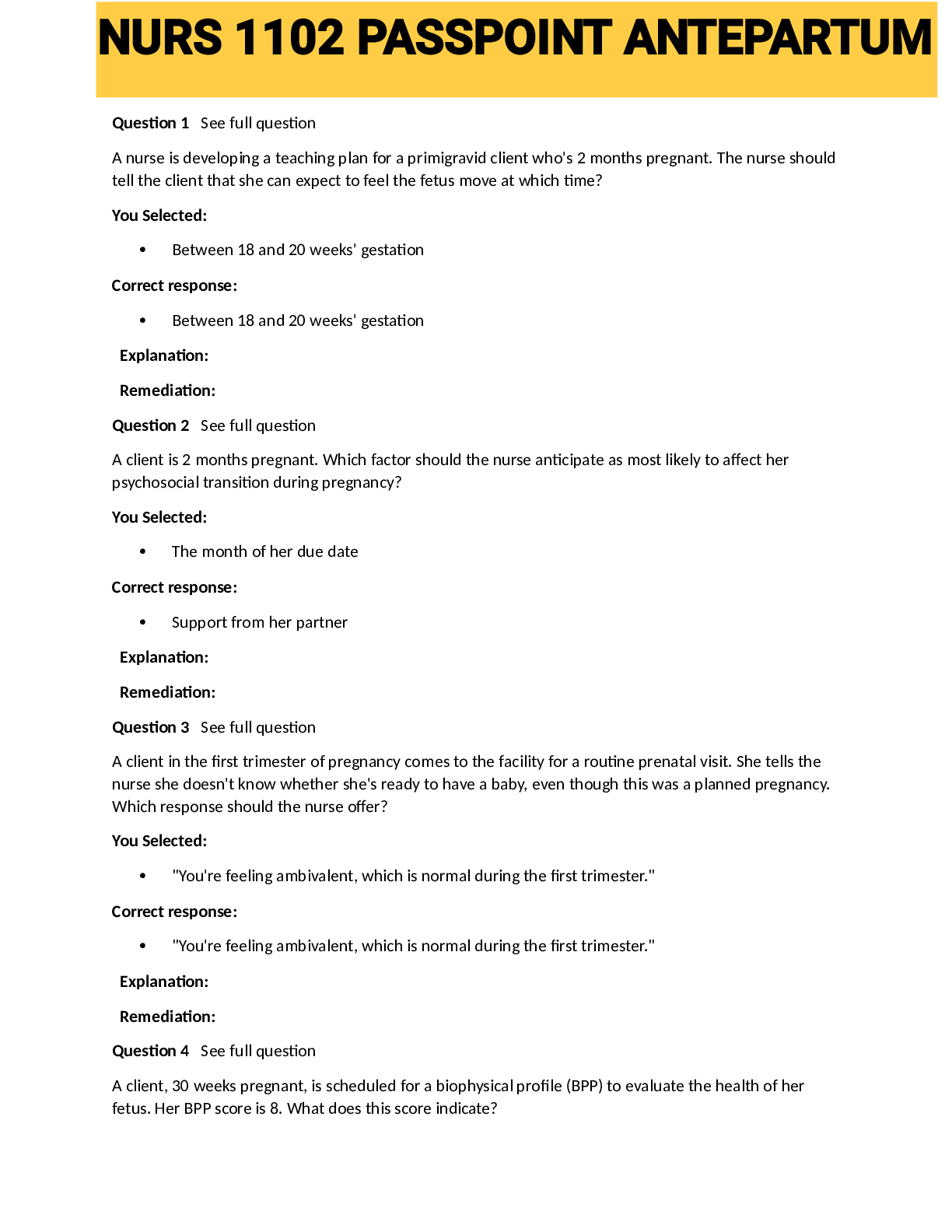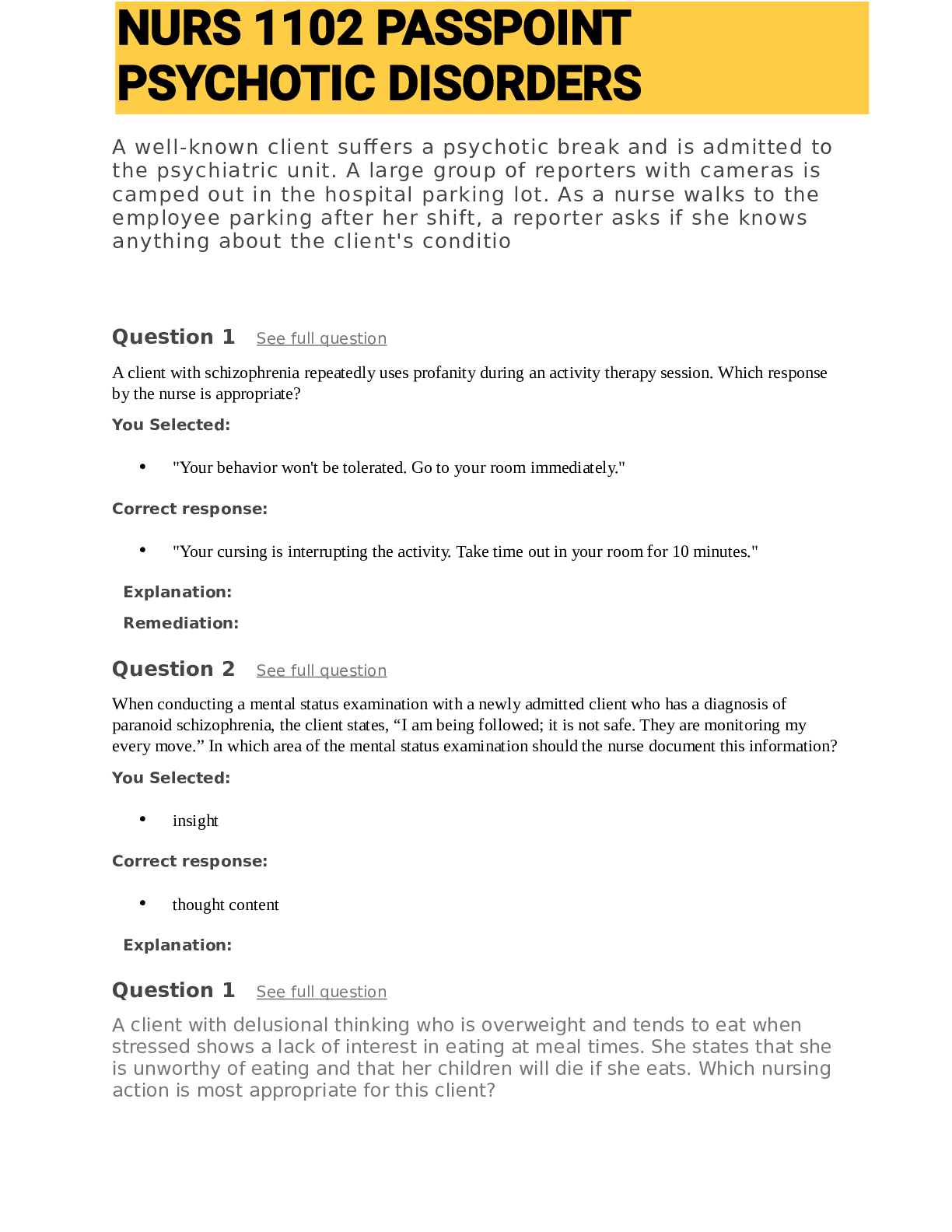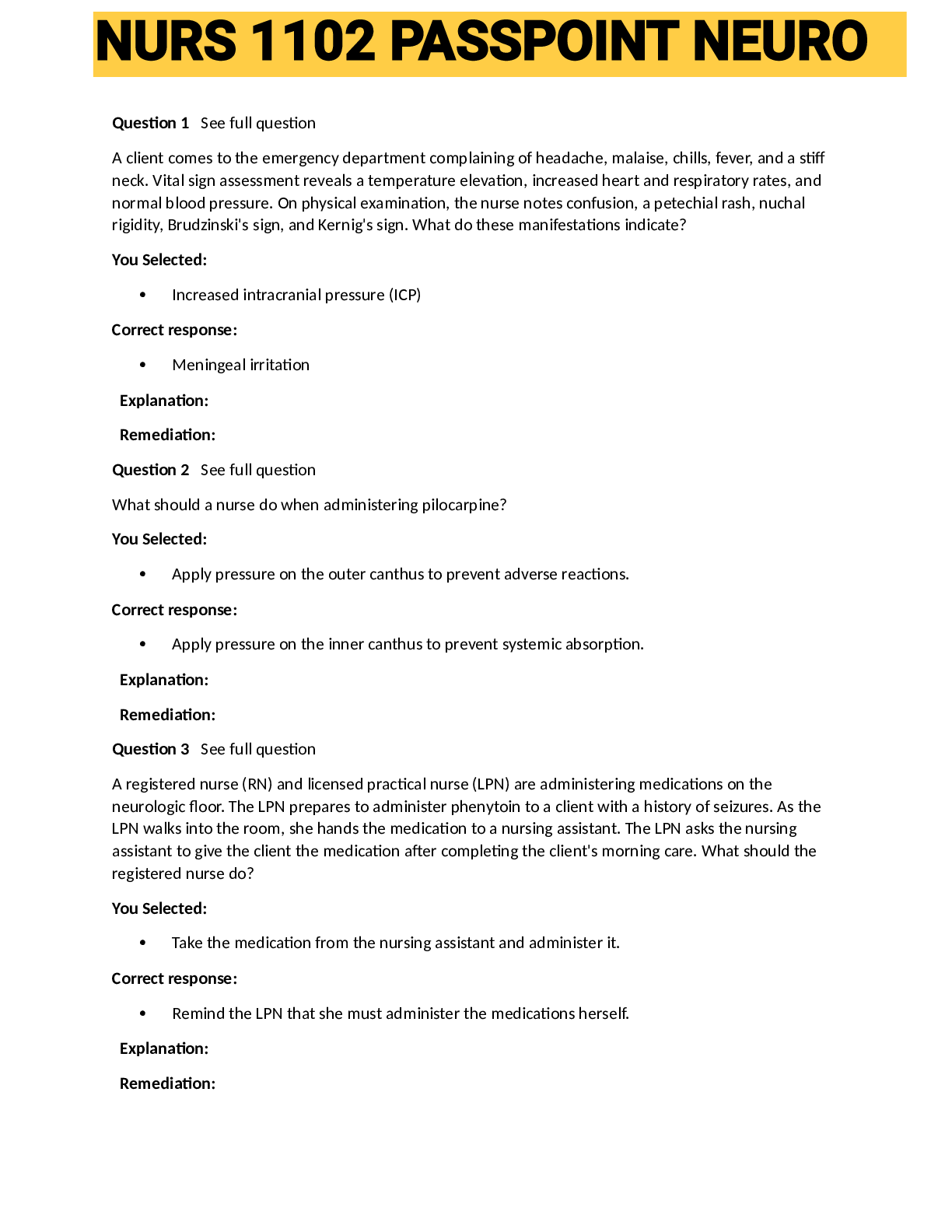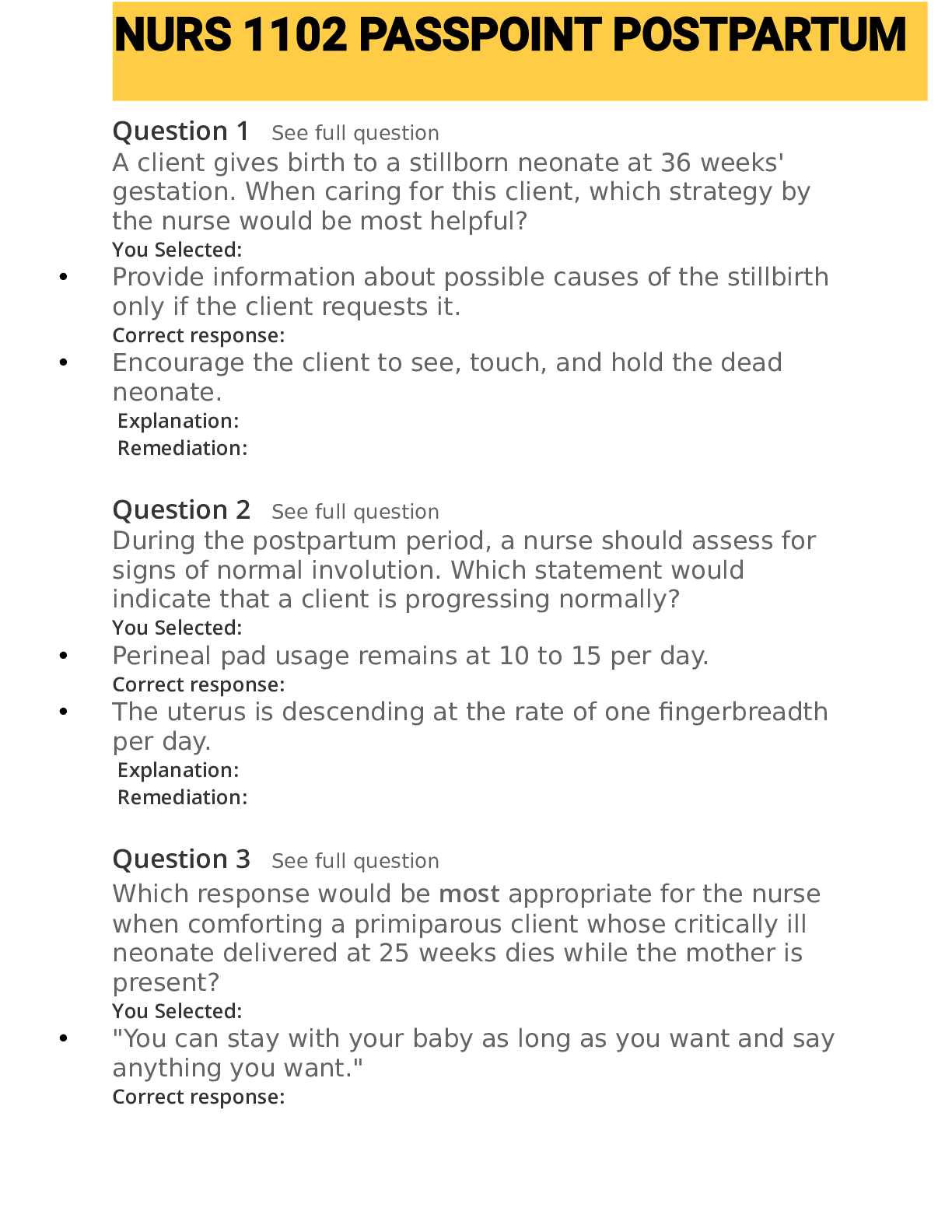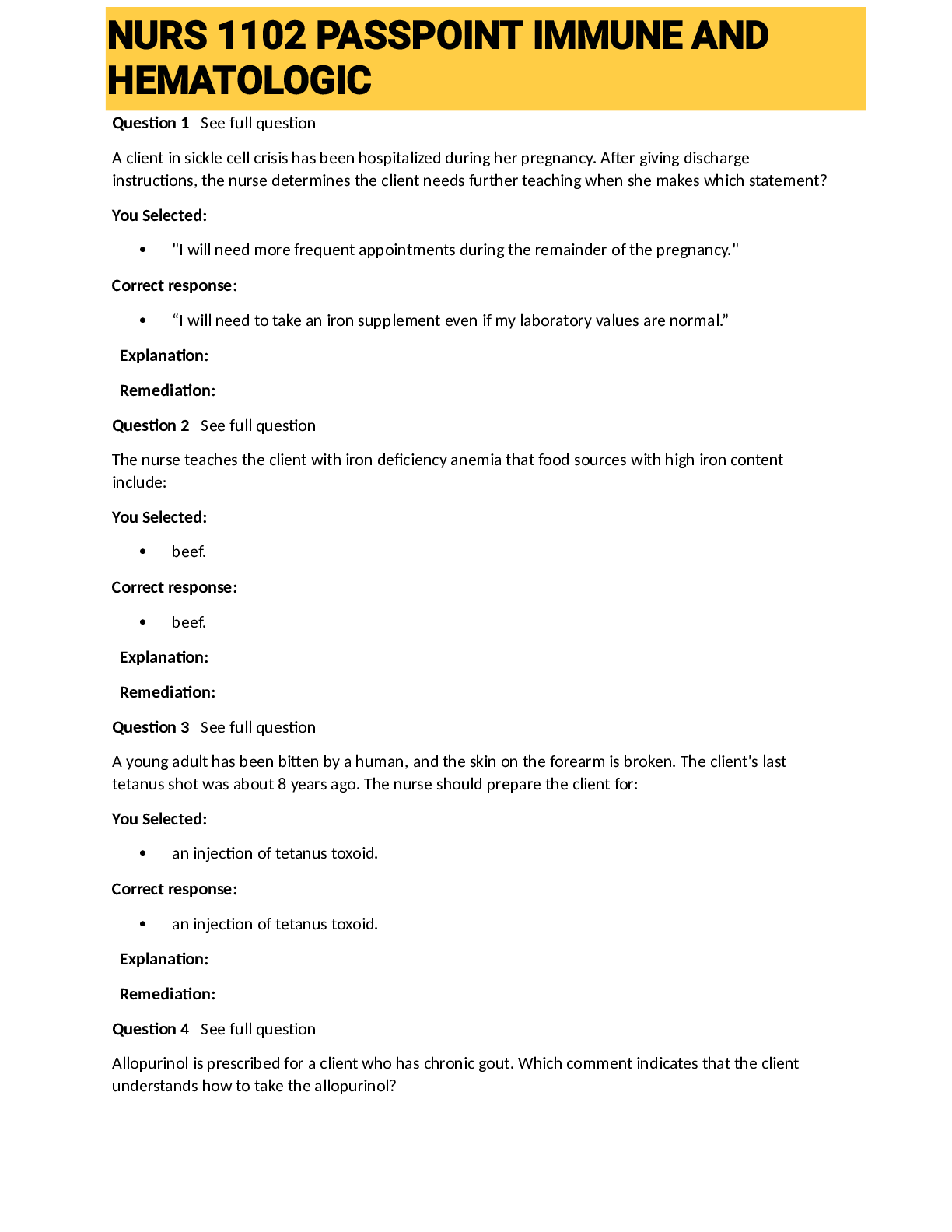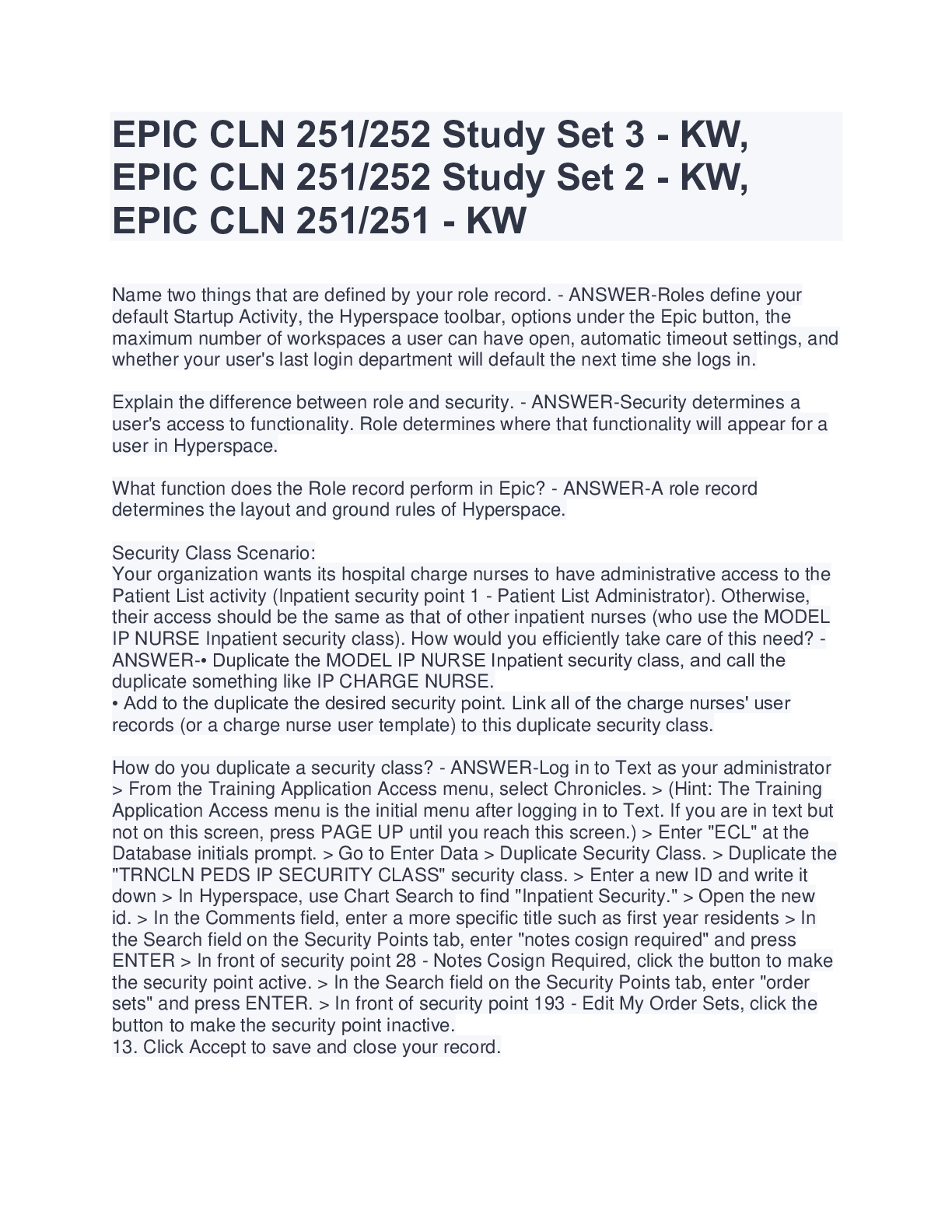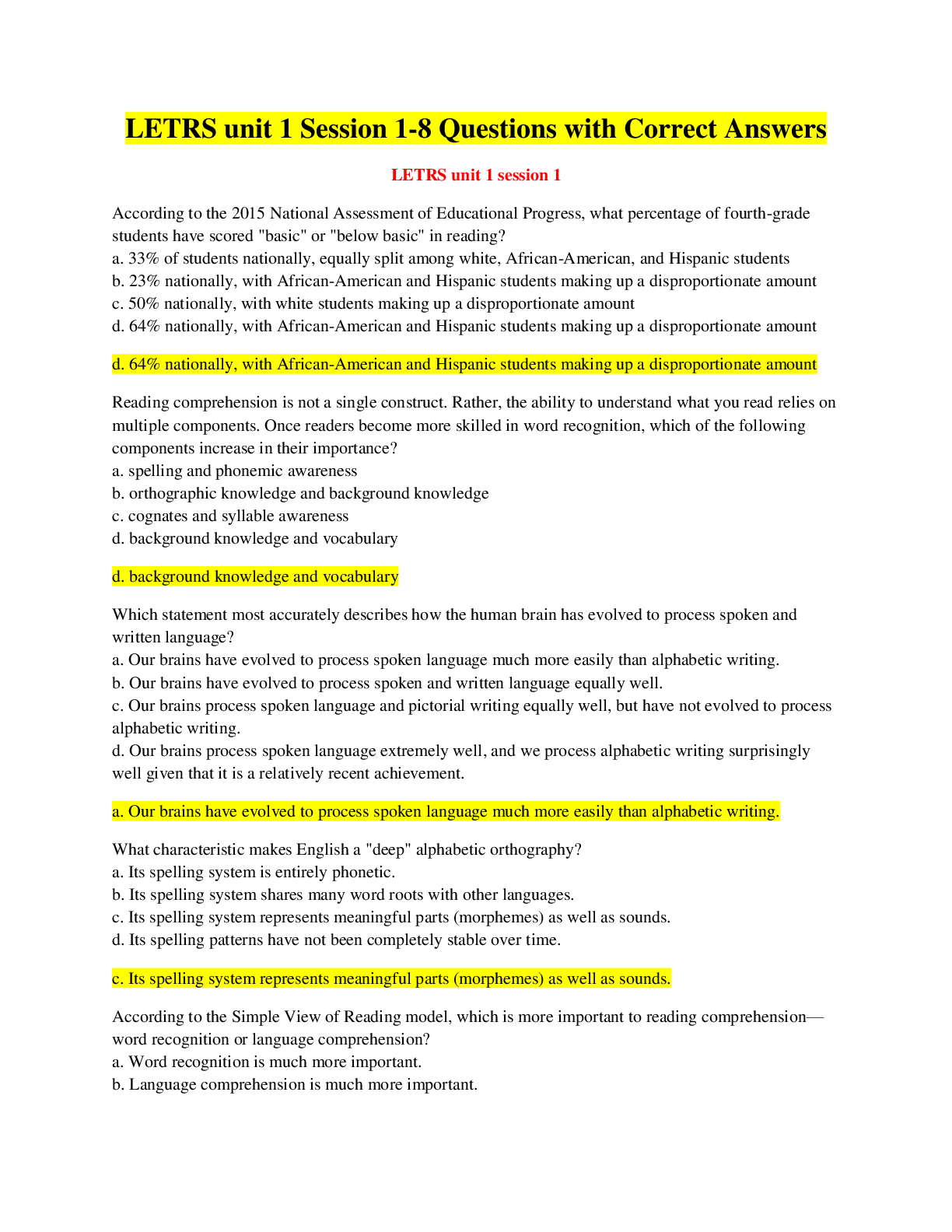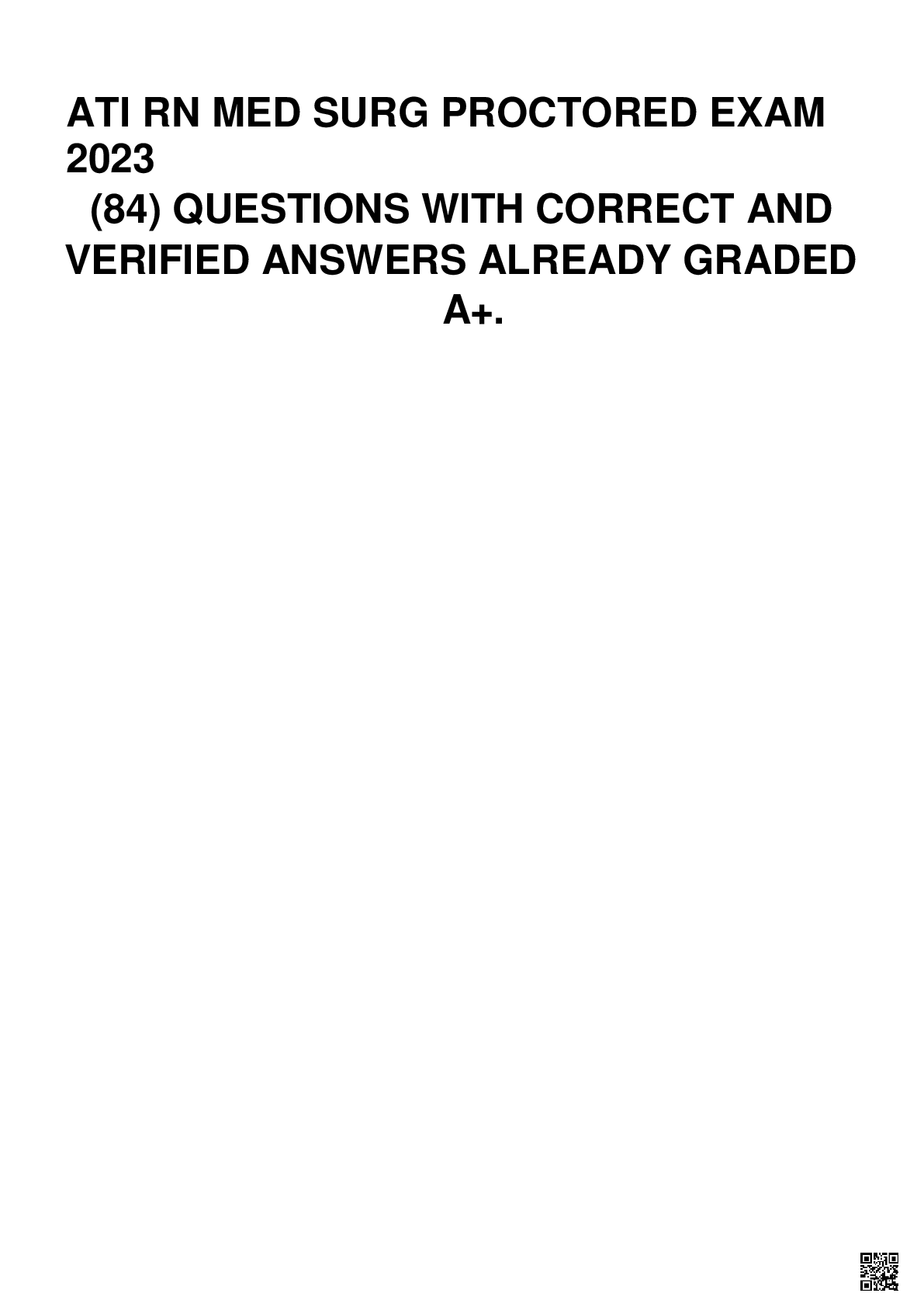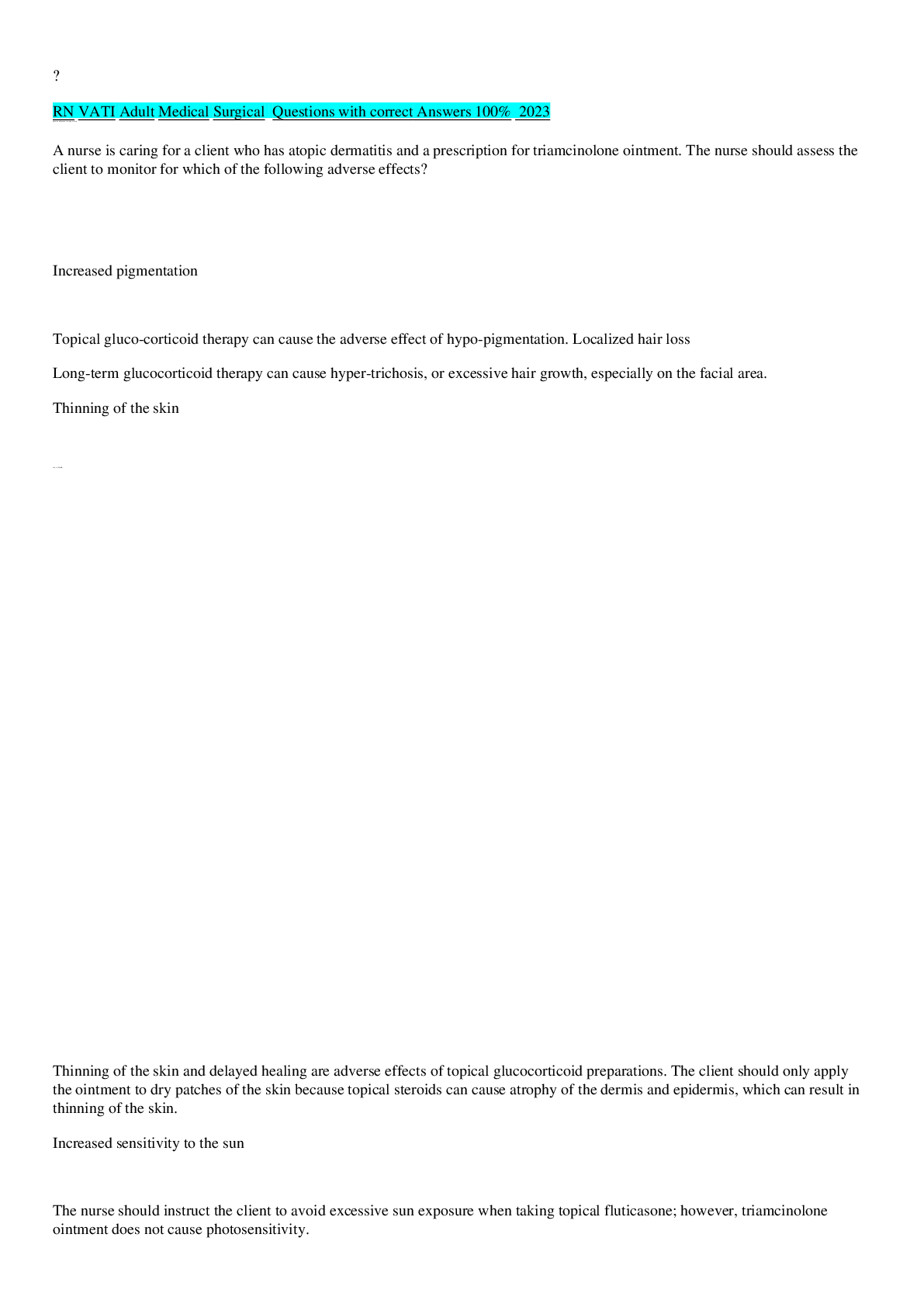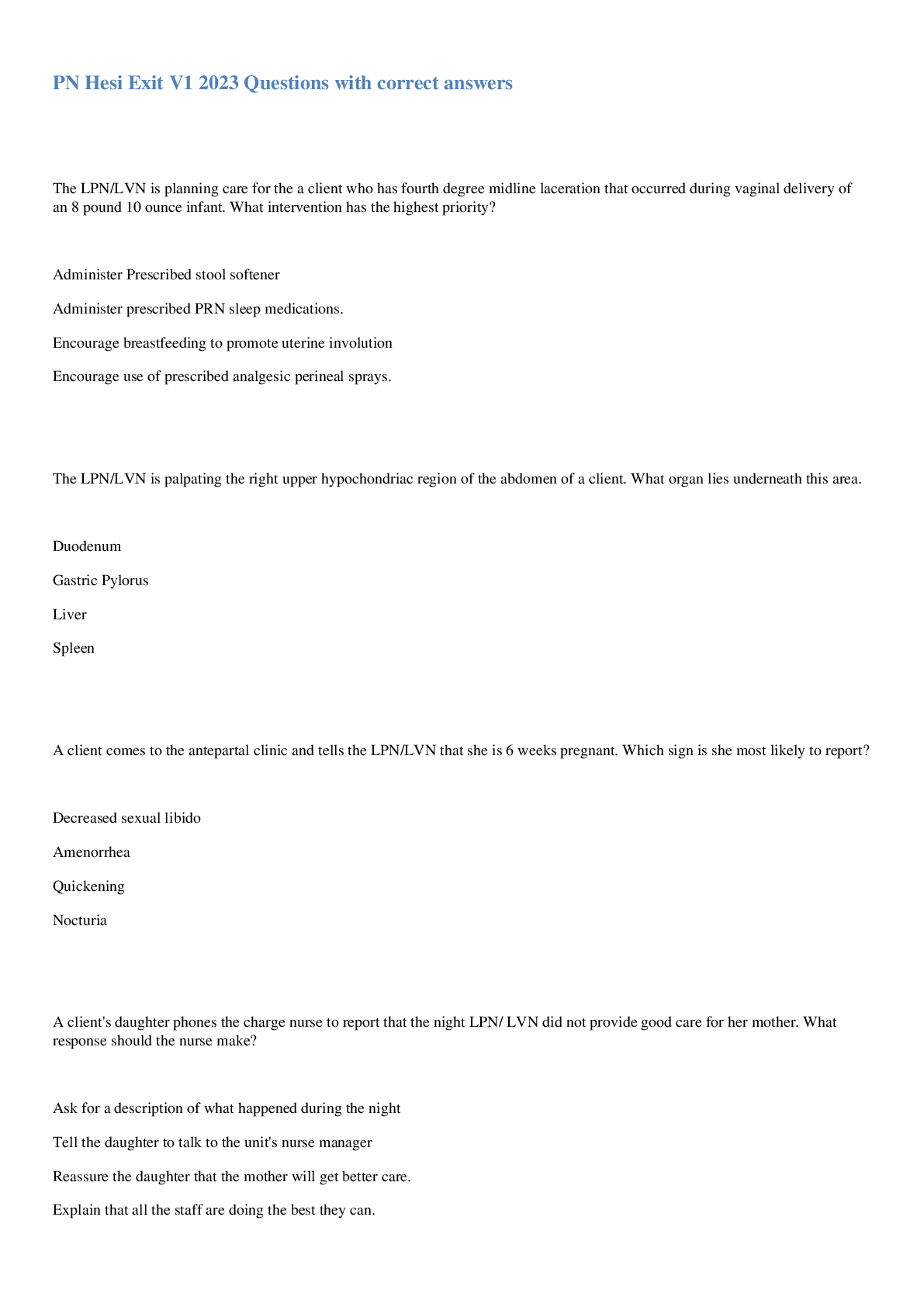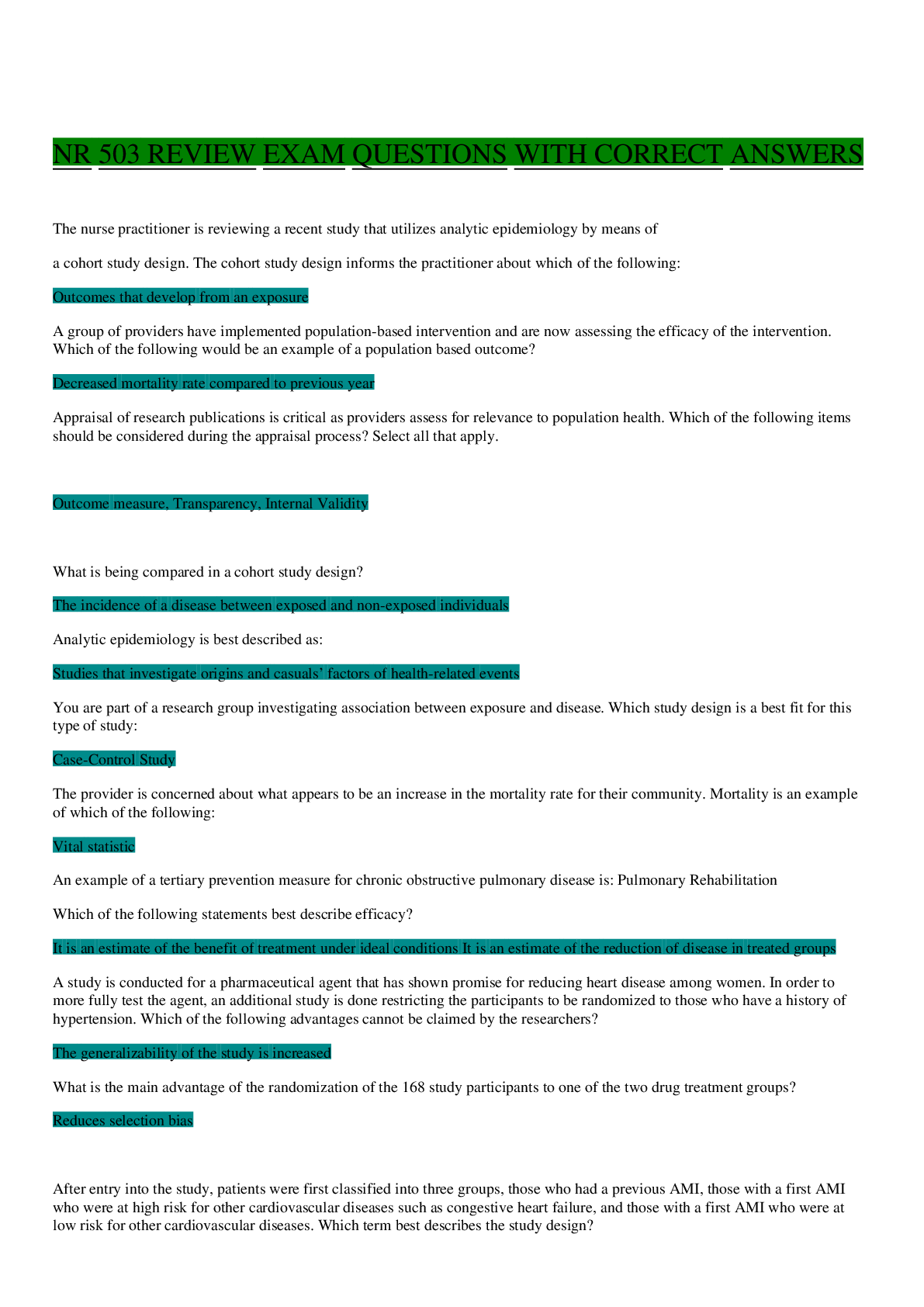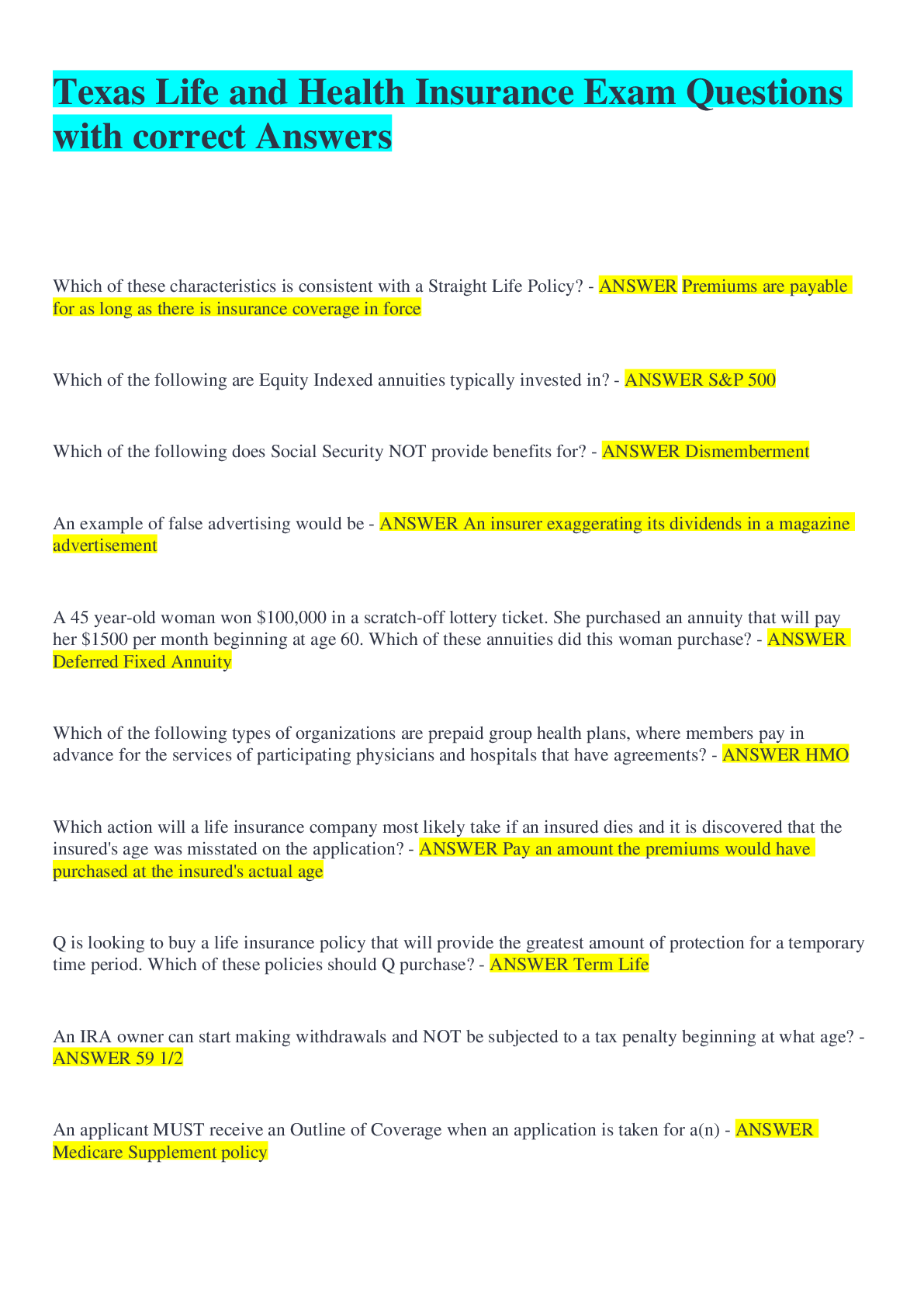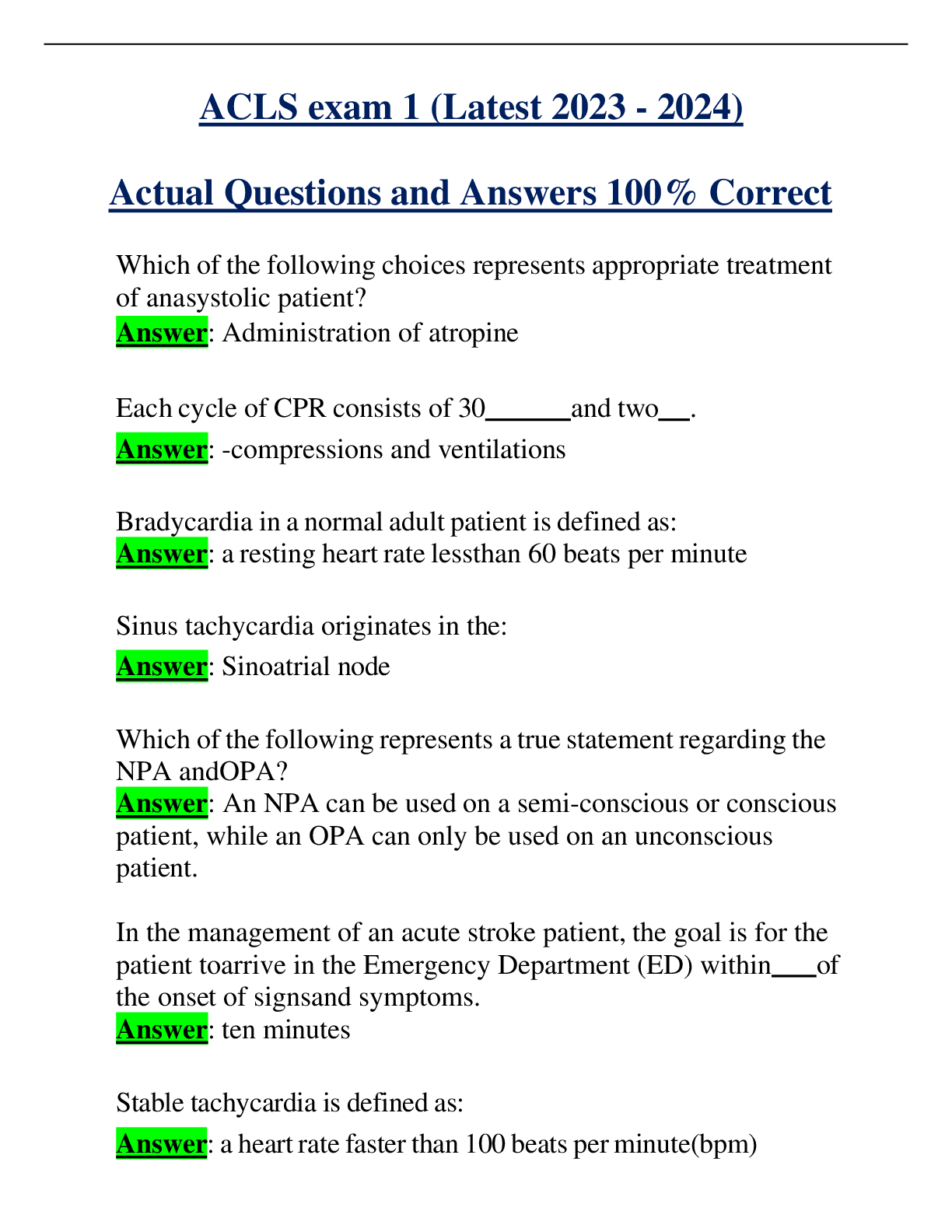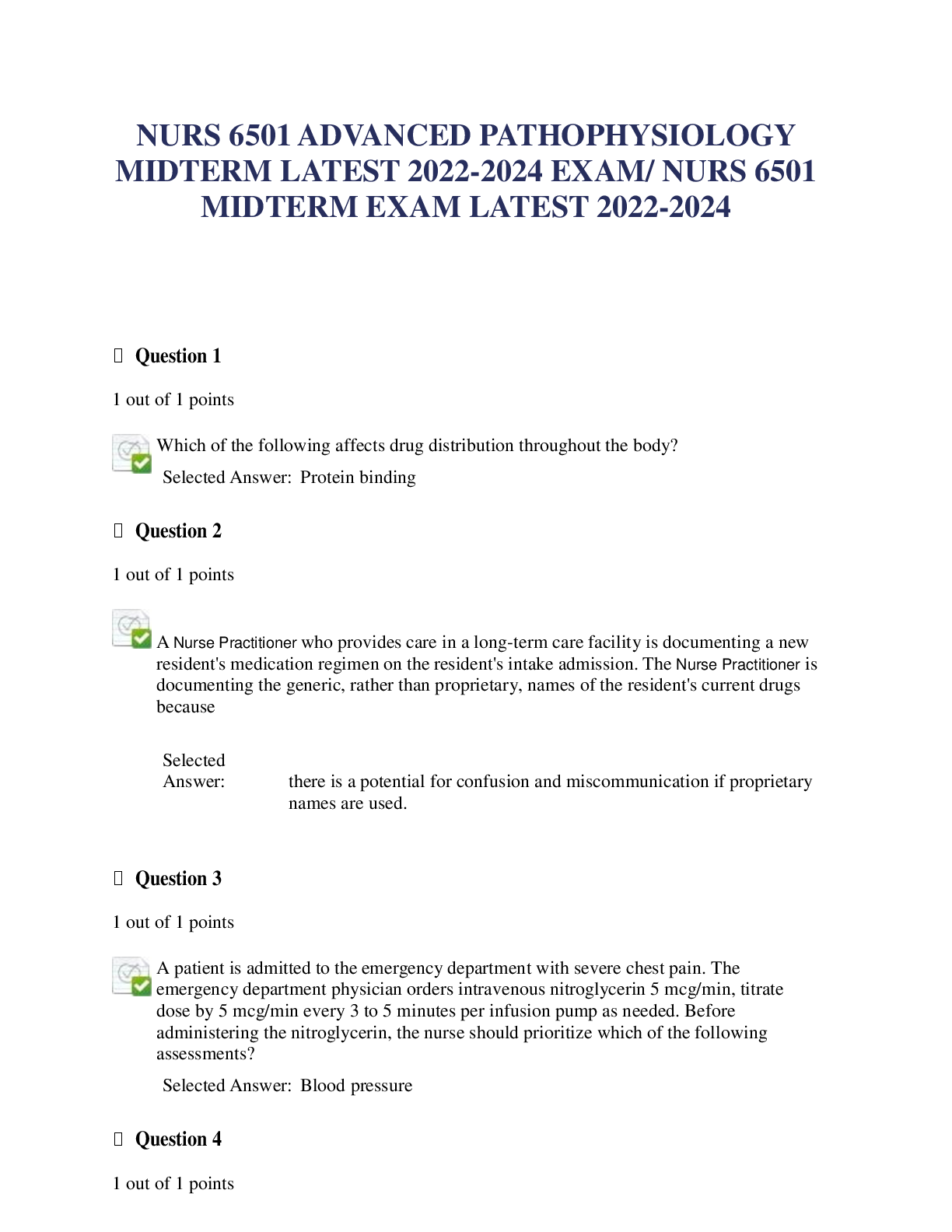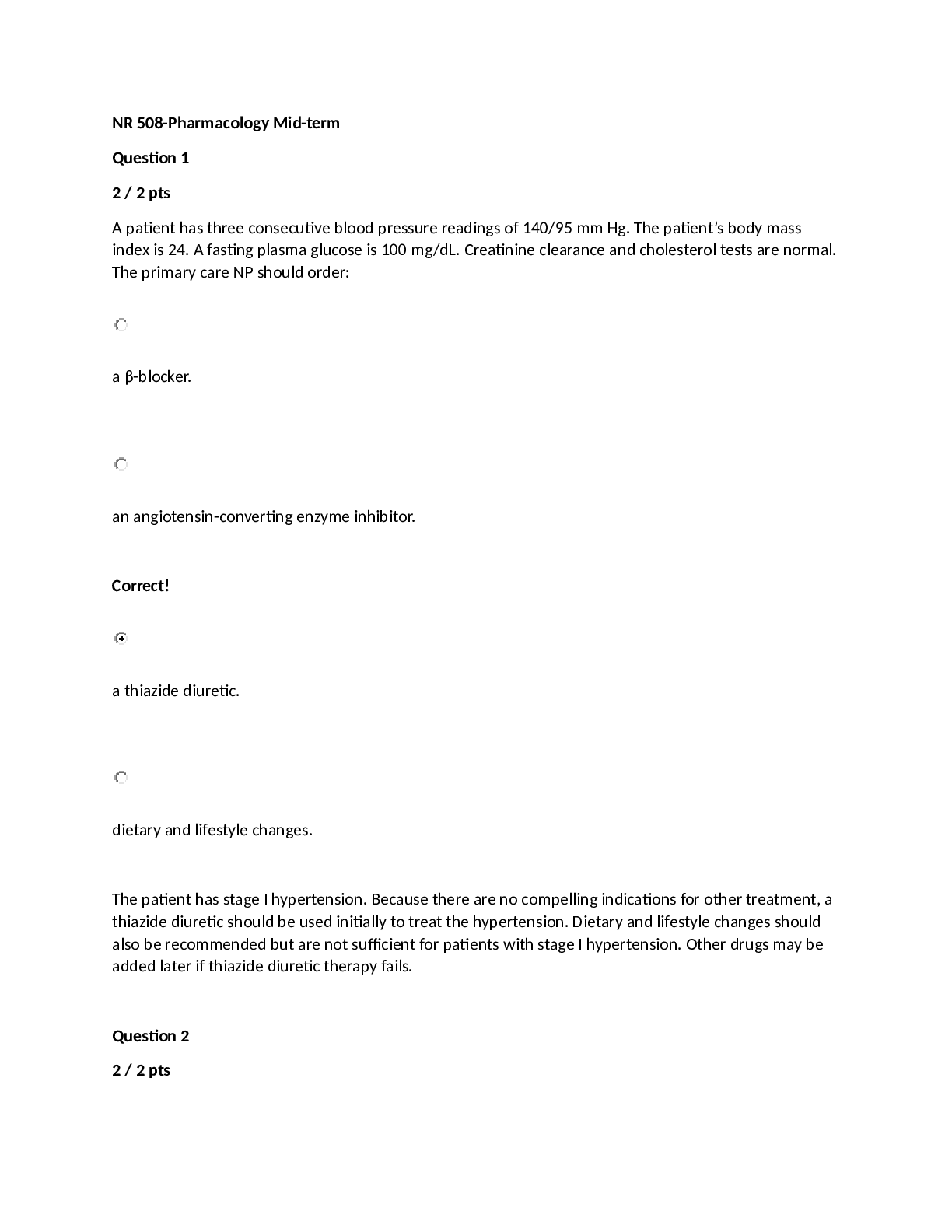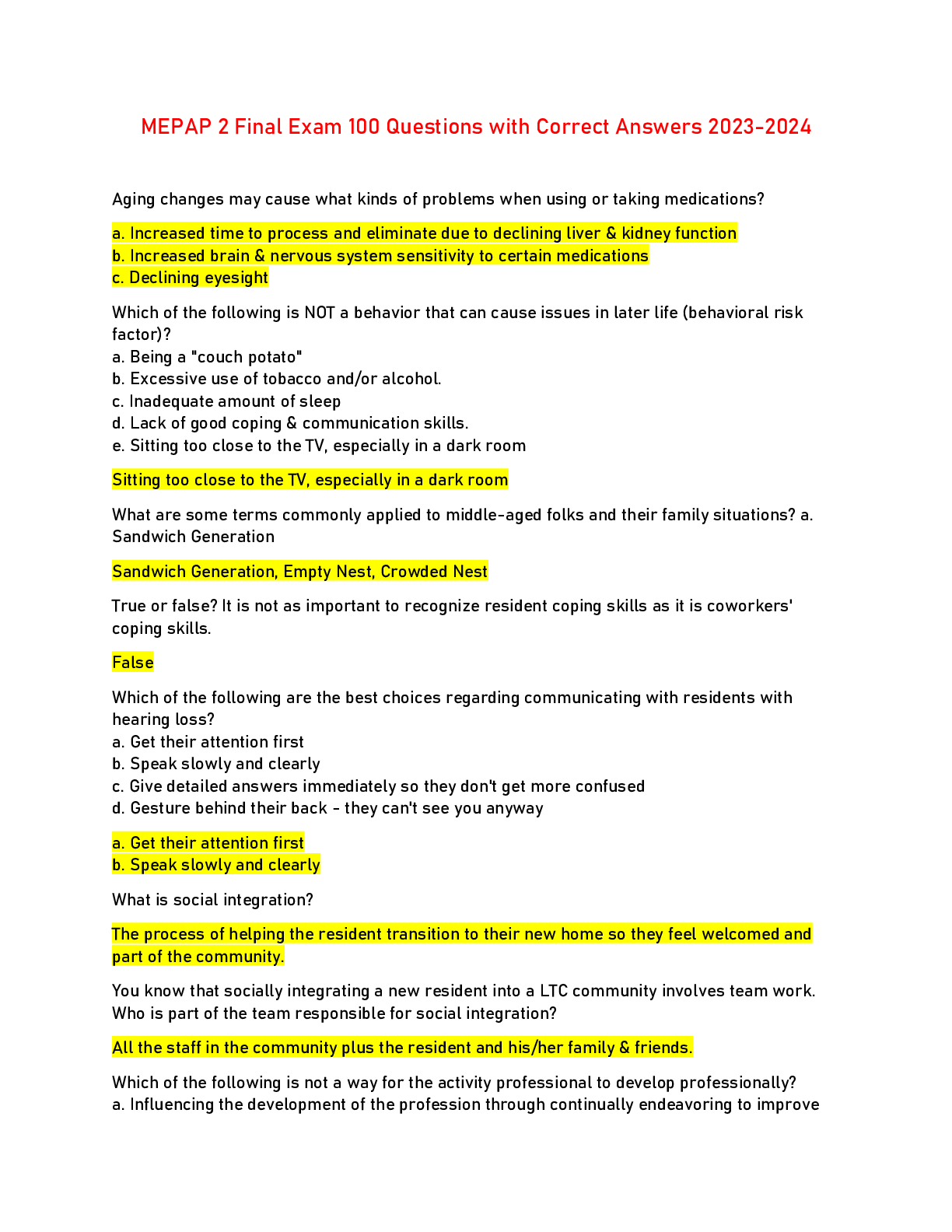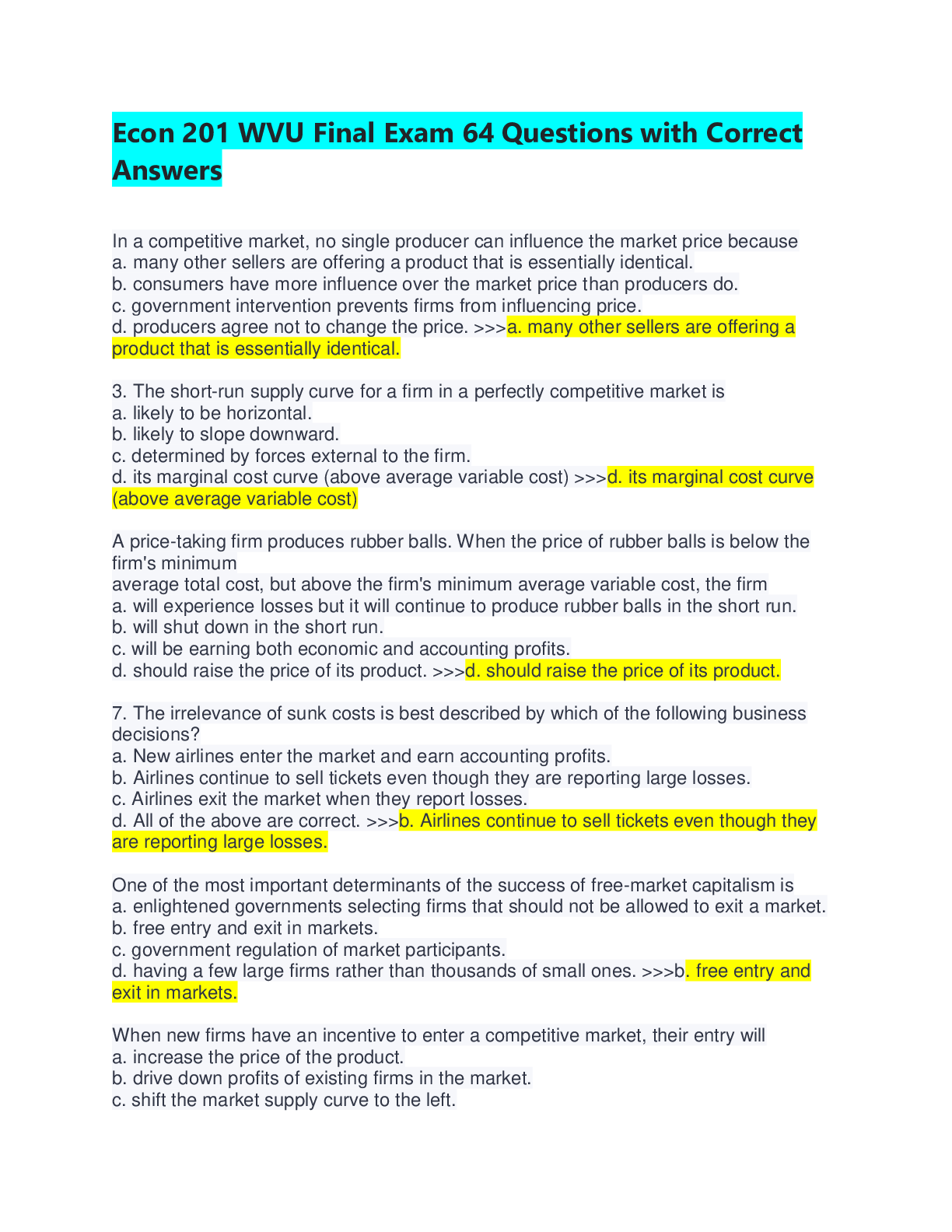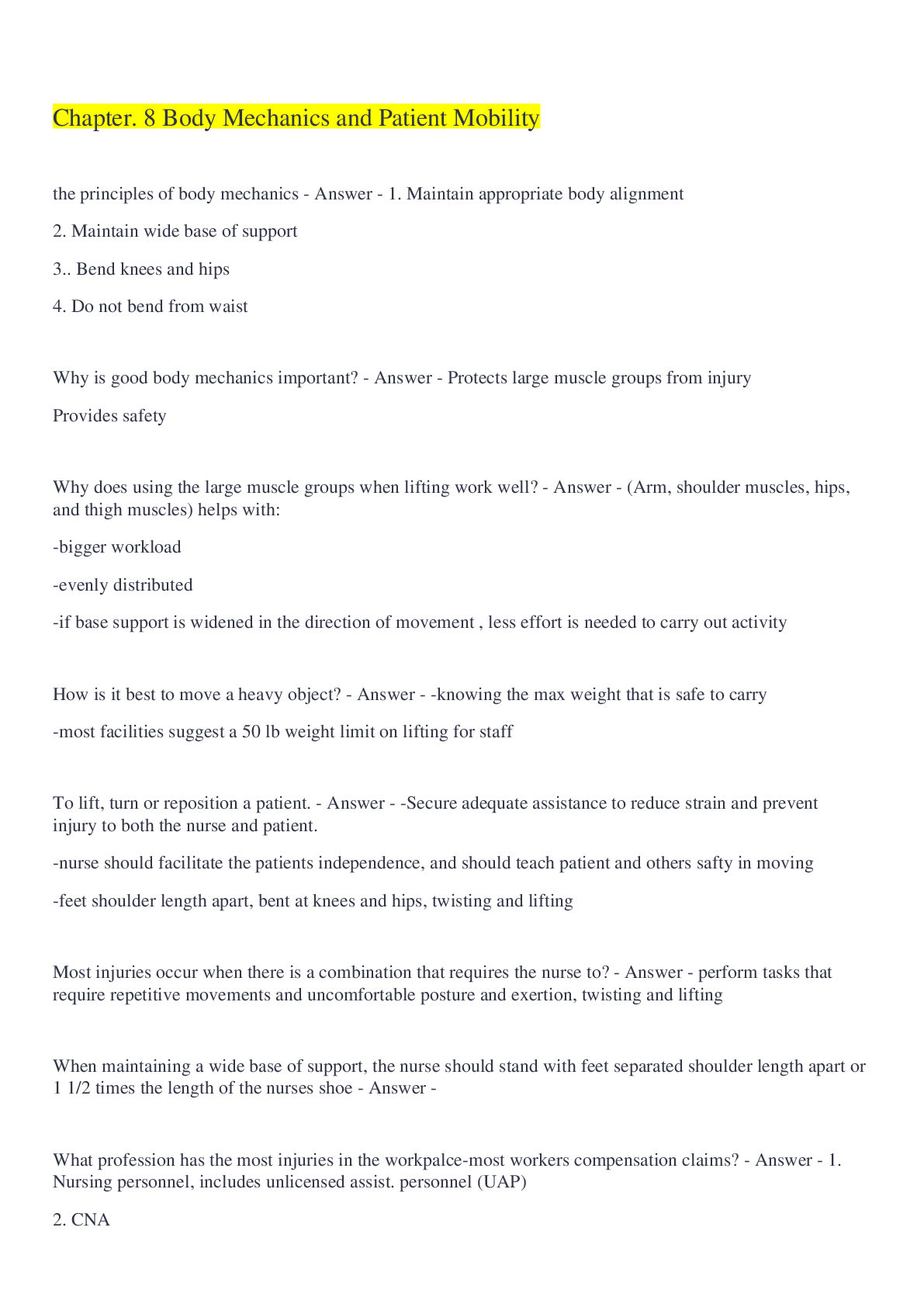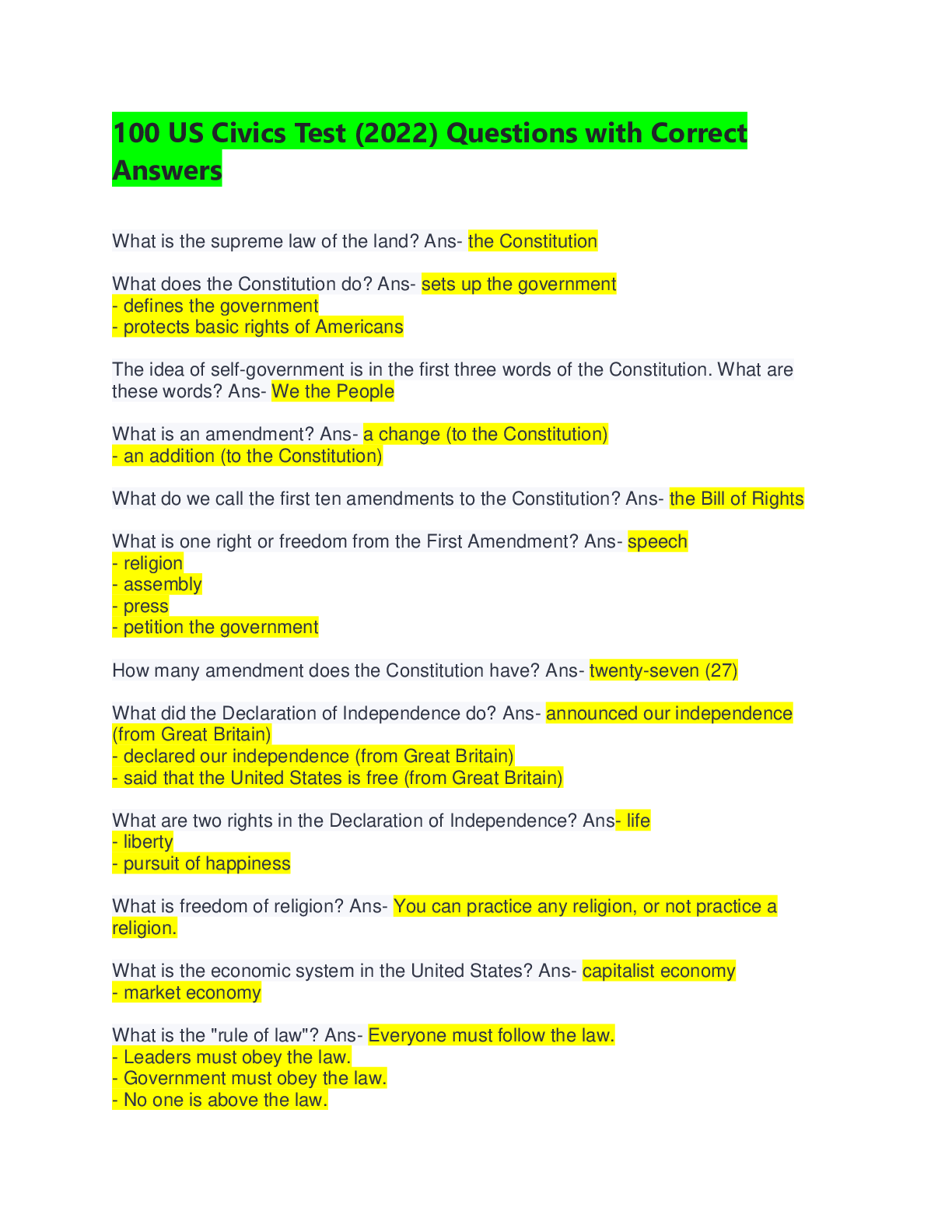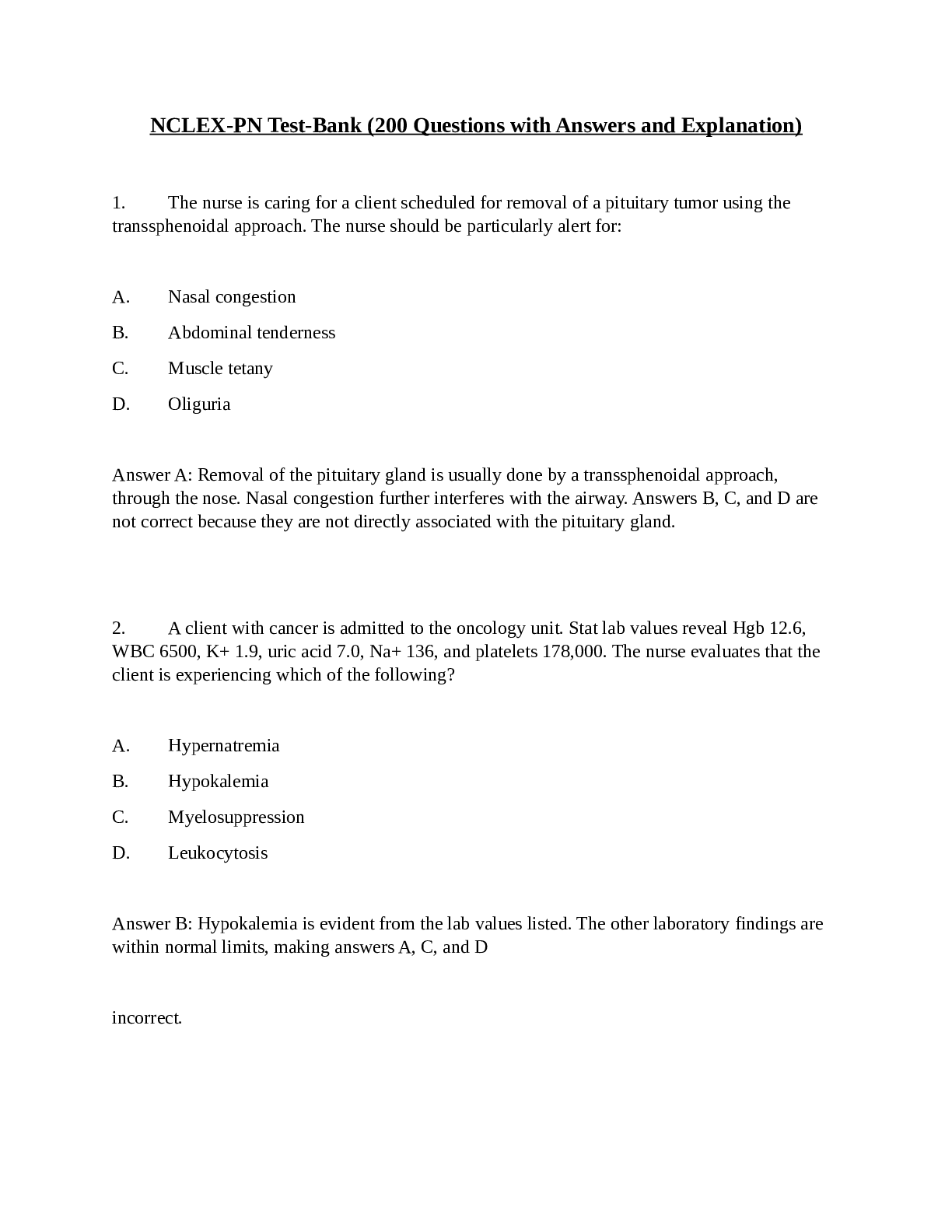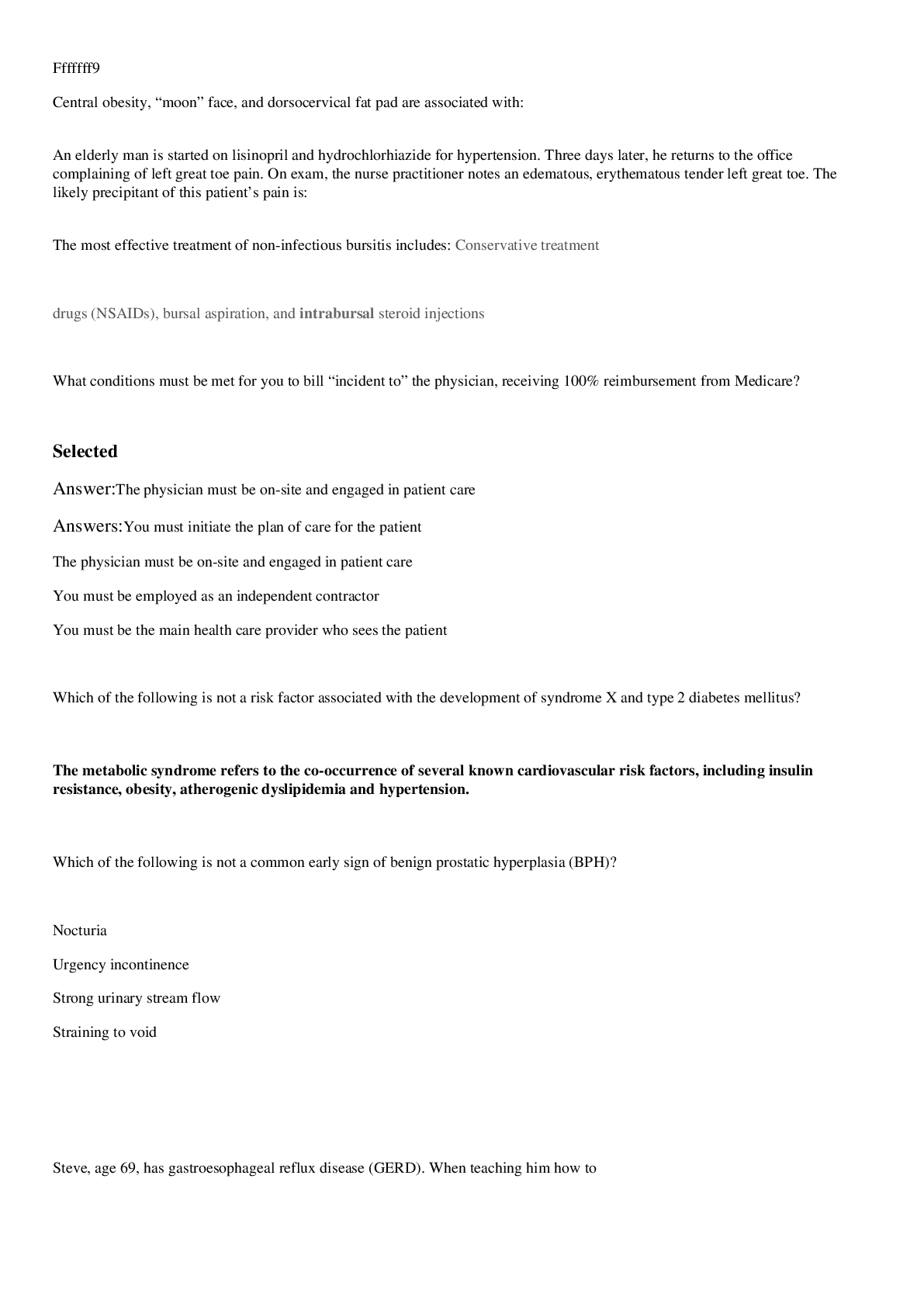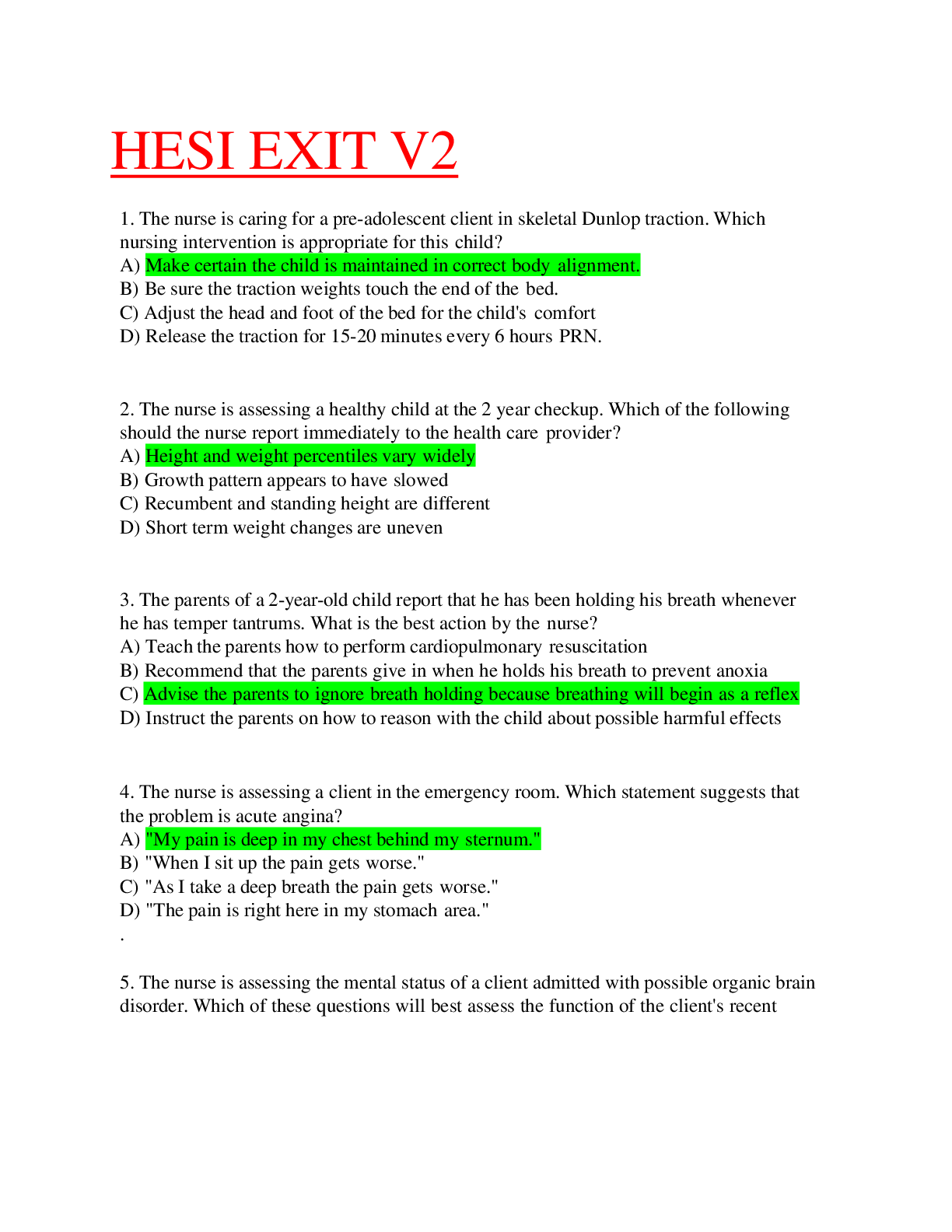*NURSING > EXAM > NURS 1102 PASSPOINT EXAM GASTROINTESTINAL Bank 2021 UPDATED 166 PAGES. All Questions with Correct So (All)
NURS 1102 PASSPOINT EXAM GASTROINTESTINAL Bank 2021 UPDATED 166 PAGES. All Questions with Correct Solutions (GRADED A)
Document Content and Description Below
NURS 1102 PASSPOINT EXAM GASTROINTESTINAL Bank 2021 UPDATED 166 PAGES. All Questions with Correct Solutions (GRADED A) PREVIEW.... Question 1 See full question A nurse is caring for a client with g... astroenteritis. The nurse administers an asneeded dose of kaolin and pectin mixture as ordered. The nurse should complete which assessment 30 minutes after administering the medication? You Selected: • Perform a pain assessment. Correct response: • Determine if the client has had any more loose stools. Explanation: Question 2 See full question A client has had a nasogastric tube connected to low intermittent suction. The client is at risk for: You Selected: • muscle cramping. Correct response: • muscle cramping. Explanation: Remediation: Question 3 See full question The nurse is developing a plan of care for a client with Crohn’s disease who is receiving total parenteral nutrition (TPN). Which interventions should the nurse include? Select all that apply. You Selected: • Monitor vital signs once a shift. • Weigh the client daily. • Monitor the IV infusion rate hourly. Correct response: • Weigh the client daily. • Monitor the IV infusion rate hourly. • Tape all IV tubing connections securely.Explanation: Remediation: Question 4 See full question A client with peptic ulcer disease is taking ranitidine. What is the expected outcome of this drug? You Selected: • Reduce acid concentration. Correct response: • Limit gastric acid secretion. Explanation: Remediation: Question 5 See full question The nurse develops a plan of care for a client with a ttube. Which nursing intervention should be included? You Selected: • • Inspect skin around the ttube daily for irritation. Correct response: Inspect skin around the ttube daily for irritation. Explanation: Remediation: Question 6 See full question Which expected outcome about nutrition would be appropriate for a client who has had a total gastrectomy for gastric cancer? The client will: You Selected: • learn to selfadminister enteral feedings every 4 hours. Correct response: • maintain adequate nutrition through oral or parenteral feedings. Explanation: Remediation:Question 7 See full question A client with a history of alcohol abuse comes to the emergency department and complains of abdominal pain. Laboratory studies help confirm a diagnosis of acute pancreatitis. The client's vital signs are stable, but the client's pain is worsening and radiating to his back. Which intervention takes priority for this client? You Selected: • Administering morphine I.V. as ordered Correct response: • Administering morphine I.V. as ordered Explanation: Remediation: Question 8 See full question The client has been taking magnesium hydroxide to control hiatal hernia symptoms. The nurse should assess the client for which condition most commonly associated with the ongoing use of magnesiumbased antacids? You Selected: • • constipation Correct response: diarrhea Explanation: Remediation: Question 9 See full question A nurse is assessing the abdomen of a client who was admitted to the emergency department with suspected appendicitis. Identify the area of the abdomen that the nurse would palpate last. You Selected:• Your selection and the correct area, market by the green box. Explanation: Remediation: Question 10 See full question A client recently diagnosed with hepatitis C states: “Now that you know what is wrong with me, you can just get me those new drugs to take care of it, right?” The nurse should tell the client: You Selected: • “The treatment is complex. There are new antiviral drugs available that may make treatment more effective and help you tolerate it better.” Correct response: “The treatment is complex. There are new antiviral drugs available that may make treatment more effective and help you tolerate it better.” Question 1 See full question A nurse is caring for a client who just had an appendectomy. The client is receiving opioid analgesics routinely for pain. The nurse should focus her follow-up assessment on which complication? You Selected: Diarrhea Correct response: Constipation Explanation: Remediation:Question 2 See full question A physician orders morphine for a client who complains of postoperative abdominal pain. For maximum pain relief, when should the nurse anticipate administering morphine? You Selected: Before the pain becomes severe Correct response: Before the pain becomes severe Explanation: Remediation: Question 3 See full question The nurse is checking the client's chart for possible contraindications, before administering meperidine, 50 mg I.M., to a client with pain after an appendectomy. The nurse should hold the meperidine when she sees an order for what type of drug? You Selected: An antibiotic Correct response: A monoamine oxidase (MAO) inhibitor Explanation: Remediation: Question 4 See full question A client is scheduled to undergo an exploratory laparoscopy. The registered nurse (RN) asks the licensed practical nurse (LPN) to prepare the client for surgery. The RN must confirm that the LPN has specialized training before delegating which task? You Selected: Weighing the client Correct response: Initiating I.V. therapy, as ordered Explanation: Question 5 See full questionA client who is legally blind must undergo a colonoscopy. The nurse is helping the physician obtain informed consent. When obtaining informed consent from a client who is visually impaired, the nurse should take which step? You Selected: Read the consent form to the client and ask him if he has any questions. Correct response: Read the consent form to the client and ask him if he has any questions. Explanation: Remediation: Question 6 See full question The nurse assesses a client with diverticulitis and suspects peritonitis when which of the following symptoms is noted? You Selected: rigid abdominal wall Correct response: rigid abdominal wall Explanation: Remediation: Question 7 See full question A nurse is assessing a client who has a potential diagnosis of pancreatitis. Which risk factors predispose the client to pancreatitis? Select all that apply. You Selected: excessive alcohol use hypertension gallstones Correct response: excessive alcohol use gallstones abdominal trauma hyperlipidemia with excessive triglyceridesExplanation: Remediation: Question 8 See full question The nurse administers a tap water enema to a client. While the solution is being infused, the client has abdominal cramping. What should the nurse do first? You Selected: Clamp the tubing, and carefully withdraw the tube. Correct response: Temporarily stop the infusion, and have the client take deep breaths. Explanation: Remediation: Question 9 See full question A client's abdominal incision eviscerates. The nurse should first: You Selected: cover the incision with a dressing moistened with sterile normal saline solution. Correct response: cover the incision with a dressing moistened with sterile normal saline solution. Explanation: Remediation: Question 10 See full question Prochlorperazine is prescribed postoperatively. The nurse should evaluate the drug's therapeutic effect when the client expresses relief from: You Selected: abdominal distention. Correct response: nausea. Explanation: Remediation: Question 11 See full questionThe nurse notes that a client with acute pancreatitis occasionally experiences muscle twitching and jerking. How should the nurse interpret the significance of these symptoms? You Selected: The client is experiencing a reaction to meperidine. Correct response: The client may be developing hypocalcemia. Explanation: Remediation: Question 12 See full question The nurse monitors a client with cirrhosis for the development of hepatic encephalopathy. Which would be an indication that hepatic encephalopathy is developing? You Selected: decreased mental status Correct response: decreased mental status Explanation: Remediation: Question 13 See full question A 36-year-old female client has been diagnosed with hemorrhoids. Which factor in the client's history would most likely be a primary cause of her hemorrhoids? You Selected: her job as a schoolteacher Correct response: three vaginal delivery pregnancies Explanation: Remediation: Question 14 See full question A client who has a history of Crohn's disease is admitted to the hospital with fever, diarrhea, cramping, abdominal pain, and weight loss. The nurse should monitor the client for: You Selected: hypokalemia. Correct response: hypokalemia. Explanation: Remediation: Question 15 See full question The nurse should teach the client with diverticulitis to integrate which measure into a daily routine at home? You Selected: using enemas to relieve constipation Correct response: refraining from straining and lifting activities Explanation: Remediation: Question 16 See full question Which instruction should the nurse include in the teaching plan for a client who is experiencing gastroesophageal reflux disease (GERD)? You Selected: Limit caffeine intake to two cups of coffee per day. Correct response: Do not lie down for 2 hours after eating. Explanation: Remediation: Question 17 See full question The nurse determines that a client’s abdominal wound has eviscerated. What should the nurse do first? You Selected: Reinsert the protruding viscera into the abdominal cavity. Correct response: Cover the wound with sterile saline-moistened dressings.Explanation: Remediation: Question 18 See full question A client has been hospitalized with pancreatitis for 3 days. The nurse assesses the client and documents the accompanying results. The nurse realizes these findings are a manifestation of what sign? You Selected: Cullen's sign Correct response: Cullen's sign Explanation: Remediation: Question 19 See full question The client with a peptic ulcer is prescribed antibiotics and bismuth salts. The nurse explains that this combination of medications will: You Selected: eradicate the Helicobacter pylori bacteria. Correct response: eradicate the Helicobacter pylori bacteria. Explanation: Remediation: Question 20 See full question A client develops chronic pancreatitis. What would be the appropriate home diet for a client with chronic pancreatitis? You Selected: a low-protein, high-fiber diet distributed over four to five moderate-sized meals daily Correct response: A low-fat, bland diet distributed over five to six small meals daily Explanation: Remediation: Question 21 See full questionWhich nursing recommendation is most appropriate for a client to decrease discomfort from hemorrhoids? You Selected: Use warm sitz baths. Correct response: Use warm sitz baths. Explanation: Remediation: Question 22 See full question Which statement indicates the client understands the lifestyle modifications required when managing ulcerative colitis? You Selected: ”I will have to stop smoking.” Correct response: ”I will have to stop smoking.” Explanation: Remediation: Question 23 See full question Because of religious beliefs, a client, who is an Orthodox Jew, refuses to eat hospital food. Hospital policy discourages food from outside the hospital. The nurse should next: You Selected: discuss the situation and possible courses of action with the dietitian and the client. Correct response: discuss the situation and possible courses of action with the dietitian and the client. Explanation: Remediation: Question 24 See full question A client has been diagnosed with cirrhosis. When obtaining a health history, the nurse should specifically determine if the client takes? You Selected: Cimetidine. Correct response: Acetaminophen. Explanation: Remediation: Question 25 See full question The nurse monitors IV replacement therapy for a client with a nasogastric (NG) tube attached to low suction in order to: You Selected: promote urination. Correct response: maintain fluid and electrolyte balance. Explanation: Remediation: Question 26 See full question The nurse assigns an unlicensed assistive personnel (UAP) to provide care for a client with peptic ulcer disease. Concerned about possible ulcer perforation, the nurse should instruct the UAP to report to the nurse immediately if the client has: You Selected: constipation. Correct response: severe abdominal pain. Explanation: Remediation: Question 27 See full question The nurse is assessing a client’s abdominal incision 48 hours after surgery. Which finding indicates that the wound is inflamed? You Selected: Serous-sanguineous drainage is noted from the wound drain. Correct response: Localized warmth over the incisional area. Explanation: Remediation: Question 28 See full question A nurse is assessing a client who reports abdominal pain, nausea, and diarrhea. The nurse knows that palpating the abdomen first would: You Selected: make it easier to hear the bowel sounds in all four quadrants. Correct response: alter abdominal sounds from baseline. Explanation: Remediation: Question 29 See full question A client with a recent history of rectal bleeding is being prepared for a colonoscopy. Initially. The nurse knows that positioning the client lying on his/her left side with the knees bent is an appropriate intervention. The nurse recognizes that this position will: You Selected: allow for proper visualization of the small intestine. Correct response: allow proper visualization of the large intestine. Explanation: Remediation: Question 30 See full question A client is admitted for suspected GI disease. Assessment data reveal muscle wasting, a decrease in chest and axillary hair, and increased bleeding tendency. The nurse suspects the client has: You Selected: appendicitis. Correct response: cirrhosis. Explanation:Remediation: Question 31 See full question A client with a peptic ulcer is about to begin a therapeutic regimen that includes a bland diet, antacids, and famotidine. Before the client is discharged, the nurse should provide which instruction? You Selected: "Increase your intake of fluids containing caffeine." Correct response: "Avoid aspirin and products that contain aspirin." Explanation: Remediation: Question 32 See full question The nurse is caring for a client with cirrhosis. Which assessment findings indicate that the client has deficient vitamin K absorption caused by this hepatic disease? You Selected: Gynecomastia and testicular atrophy Correct response: Purpura and petechiae Explanation: Remediation: Question 33 See full question A client is admitted to the hospital for diagnostic testing to rule out colorectal cancer. Which intervention should the nurse include on the plan of care? You Selected: Test all stools for occult blood. Correct response: Test all stools for occult blood. Explanation: Remediation: Question 34 See full questionA nurse is caring for a client with active upper GI bleeding. What is the appropriate diet for this client during the first 24 hours after admission? You Selected: Increased dairy products Correct response: Nothing by mouth Explanation: Remediation: Question 35 See full question A nurse is teaching an elderly client about developing good bowel habits. Which statement by the client indicates to the nurse that additional teaching is required? You Selected: "I should try to drink twice as much water as I am now." Correct response: "I need to use laxatives regularly to prevent constipation." Explanation: Remediation: Question 36 See full question A nurse is monitoring a client recovering from moderate sedation that was administered during a colonoscopy. Which finding requires the nurse's immediate attention? You Selected: Oxygen saturation (SaO2 ) of 89% Correct response: Oxygen saturation (SaO2 ) of 89% Explanation: Remediation: Question 37 See full question A client with Crohn's disease is scheduled for a barium enema. What should the plan of care include today to prepare for the test tomorrow? You Selected: Serve the client a regular diet. Correct response: Encourage plenty of fluids. Explanation: Remediation: Question 38 See full question A client is scheduled for an ileostomy. Which would be most helpful in preparing the client psychologically for the surgery? You Selected: Encourage the client to ask questions about managing an ileostomy. Correct response: Provide a brief, thorough explanation of all preoperative and postoperative procedures. Explanation: Remediation: Question 39 See full question A nurse is giving instructions to a client with a new colostomy. The client states, “I am so tired today; I just cannot think.” The nurse should: You Selected: reschedule the appointment at a time when the client is rested. Correct response: reschedule the appointment at a time when the client is rested. Explanation: Question 40 See full question A client with chronic hepatitis C is experiencing nausea, anorexia, and fatigue. During the health history the client states that he is homosexual, drinks one to two glasses of wine with dinner, is taking St. John’s Wort for a “bit of depression,” and takes acetaminophen for frequent headaches. What should the nurse do? Select all that apply. You Selected: Encourage the client to obtain sufficient rest. Instruct the client to ask the health care provider (HCP) about taking any other medications as they may interact with medications the client is currently taking. Instruct the client that the wine with meals can be beneficial for cardiovascular health. Correct response: Instruct the client to ask the health care provider (HCP) about taking any other medications as they may interact with medications the client is currently taking. Advise the client of the need for additional testing for HIV. Encourage the client to obtain sufficient rest. Explanation: Remediation: Question 41 See full question A client is suspected of having a slow gastrointestinal bleed. The nurse should evaluate the client for which sign? You Selected: tarry stools Correct response: tarry stools Explanation: Remediation: Question 42 See full question The health care provider prescribes sulfasalazine for the client with ulcerative colitis. Which instruction should the nurse give the client about taking this medication? You Selected: Take it with a full glass (240 mL) of water. Correct response: Take it with a full glass (240 mL) of water. Explanation: Remediation: Question 43 See full question A client has been diagnosed with an intestinal obstruction and has a nasogastric tube set to low continuous suction. Which acid-base disturbance is this client at risk for developing? You Selected: Respiratory alkalosis Correct response: Metabolic alkalosis Explanation: Remediation: Question 44 See full question The nurse is aware that client teaching has been effective about the potential toxic reactions to a vitamin B12 injection by the following statement. Select all that apply. You Selected: "I will need to check with my physician about continued use." "Vitamin B12 is generally free of toxicity because it is water soluble." "Vitamin B12 will cause ringing in the ears before a toxic level is reached." Correct response: "I may be asked to remain in the clinic for 30 minutes after my first injection." "I will need to check with my physician about continued use." "Vitamin B12 is generally free of toxicity because it is water soluble." Explanation: Question 45 See full question A nurse is administering medications to a client diagnosed with hepatitis B. When the nurse hands the client his/her medications, the client says, "I would rather not take that pill or any others. I know there is no cure for hepatitis B." The nurse recognizes that the client is expressing feelings of hopelessness about the diagnosis. Select the best responses by the nurse. Select all that apply. You Selected: "I'm going to let the physician talk to you." "You seem frustrated. Would you like to talk?" "You can lead a long and fairly healthy life if you are compliant with your medications." Correct response: "You can lead a long and fairly healthy life if you are compliant with your medications." "You seem frustrated. Would you like to talk?" "You have the right to refuse any medications. Would you like to discuss your feelings about this disease?" Explanation: Question 46 See full question A client diagnosed with peptic ulcer disease (PUD) has an H. pylori infection. The client is following a 2week drug regimen that includes clarithromycin along with omeprazole and amoxicillin. The nurse should instruct the client to: You Selected: take the dru [Show More]
Last updated: 1 year ago
Preview 1 out of 166 pages
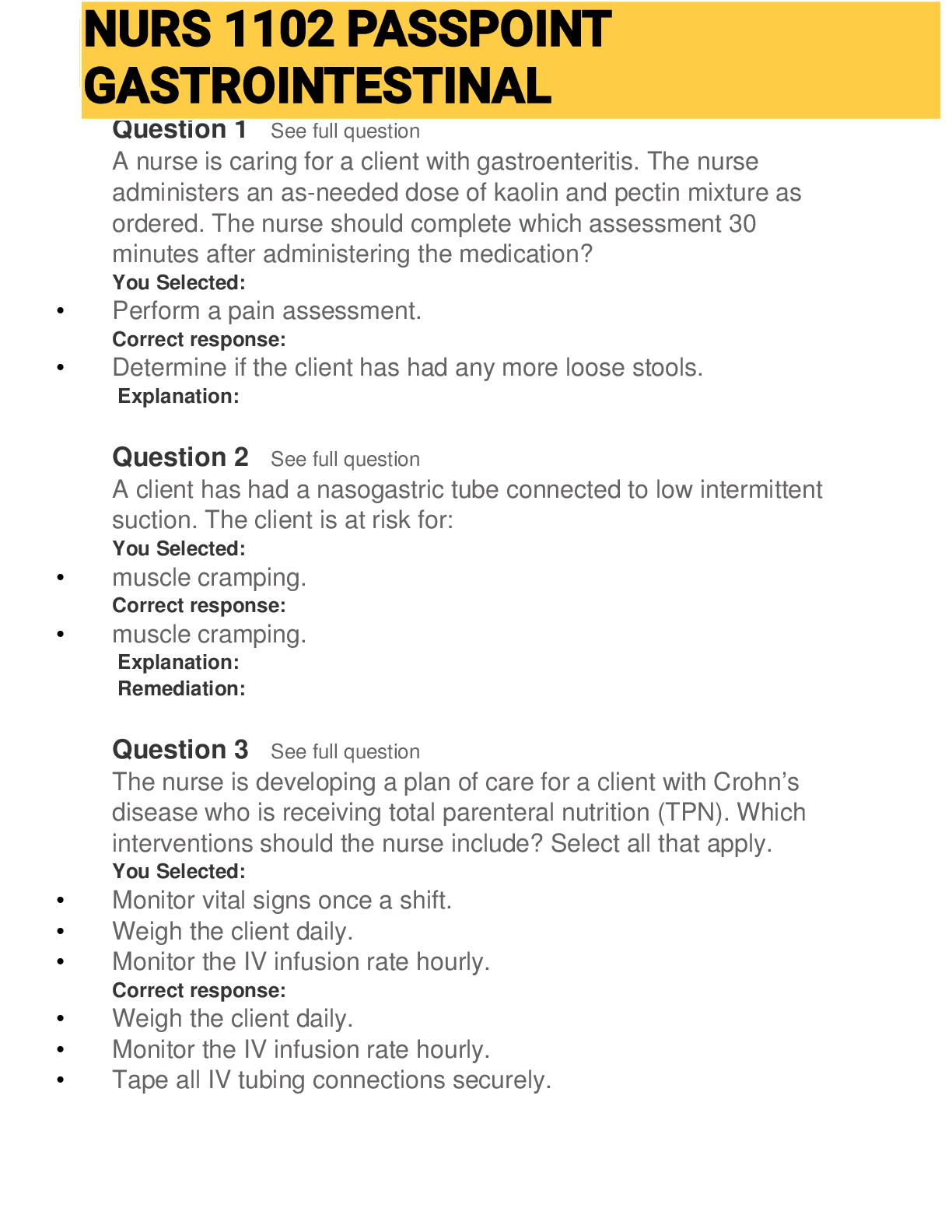
Reviews( 1 )

by kerb · 1 year ago
Document information
Connected school, study & course
About the document
Uploaded On
Oct 13, 2021
Number of pages
166
Written in
Additional information
This document has been written for:
Uploaded
Oct 13, 2021
Downloads
1
Views
91
